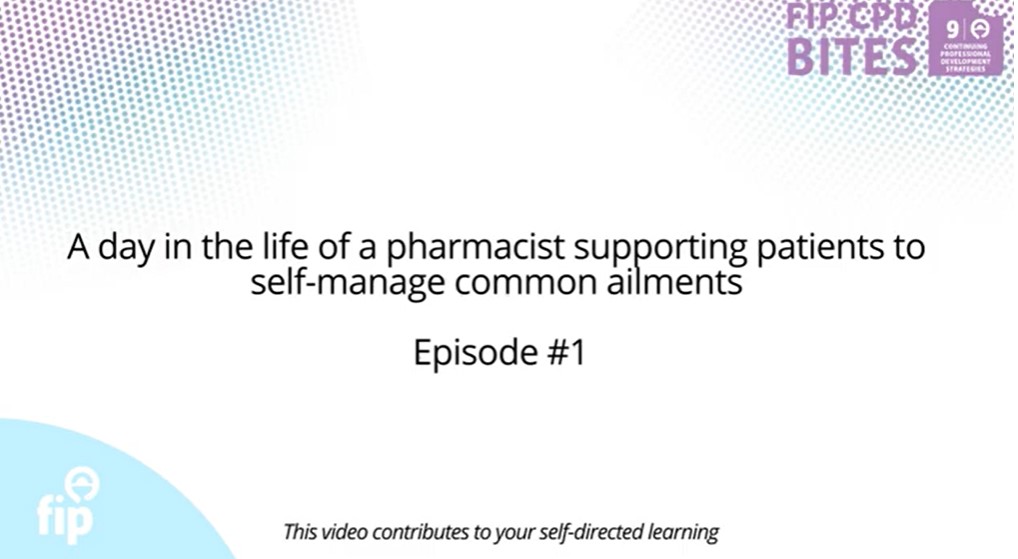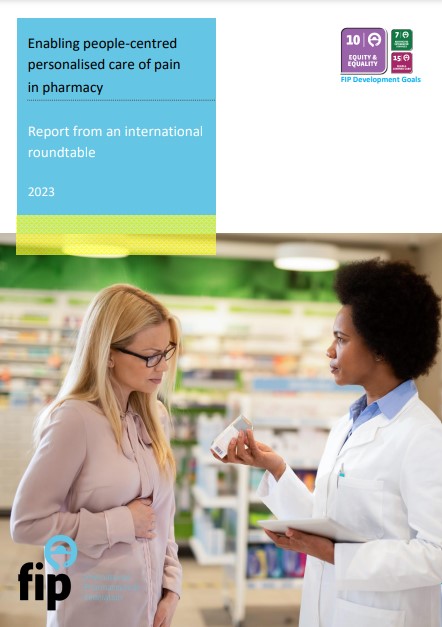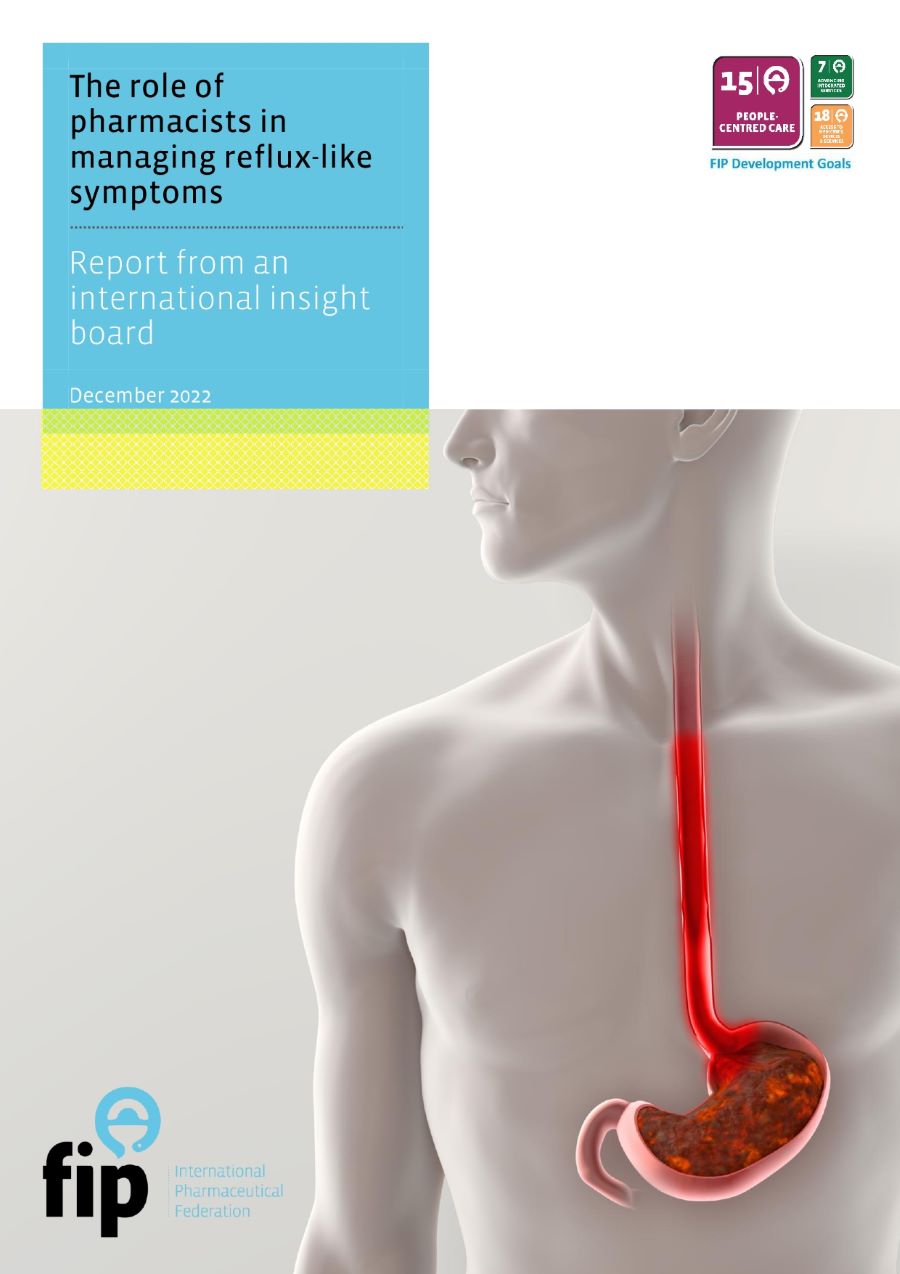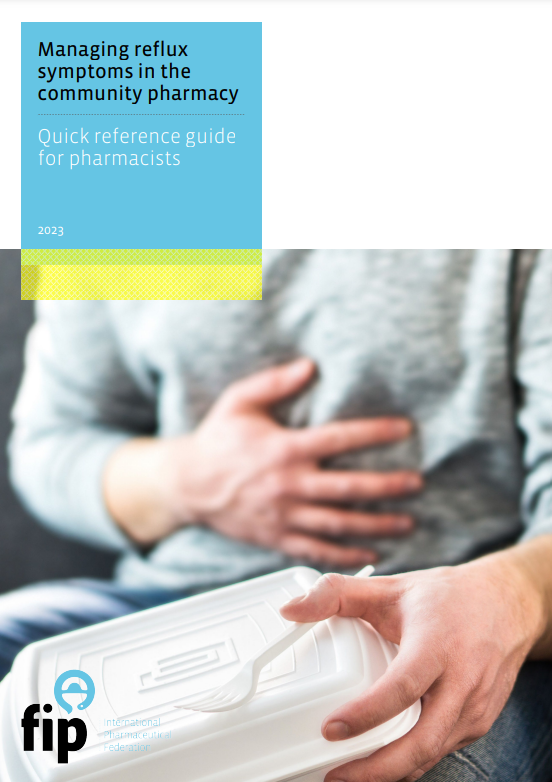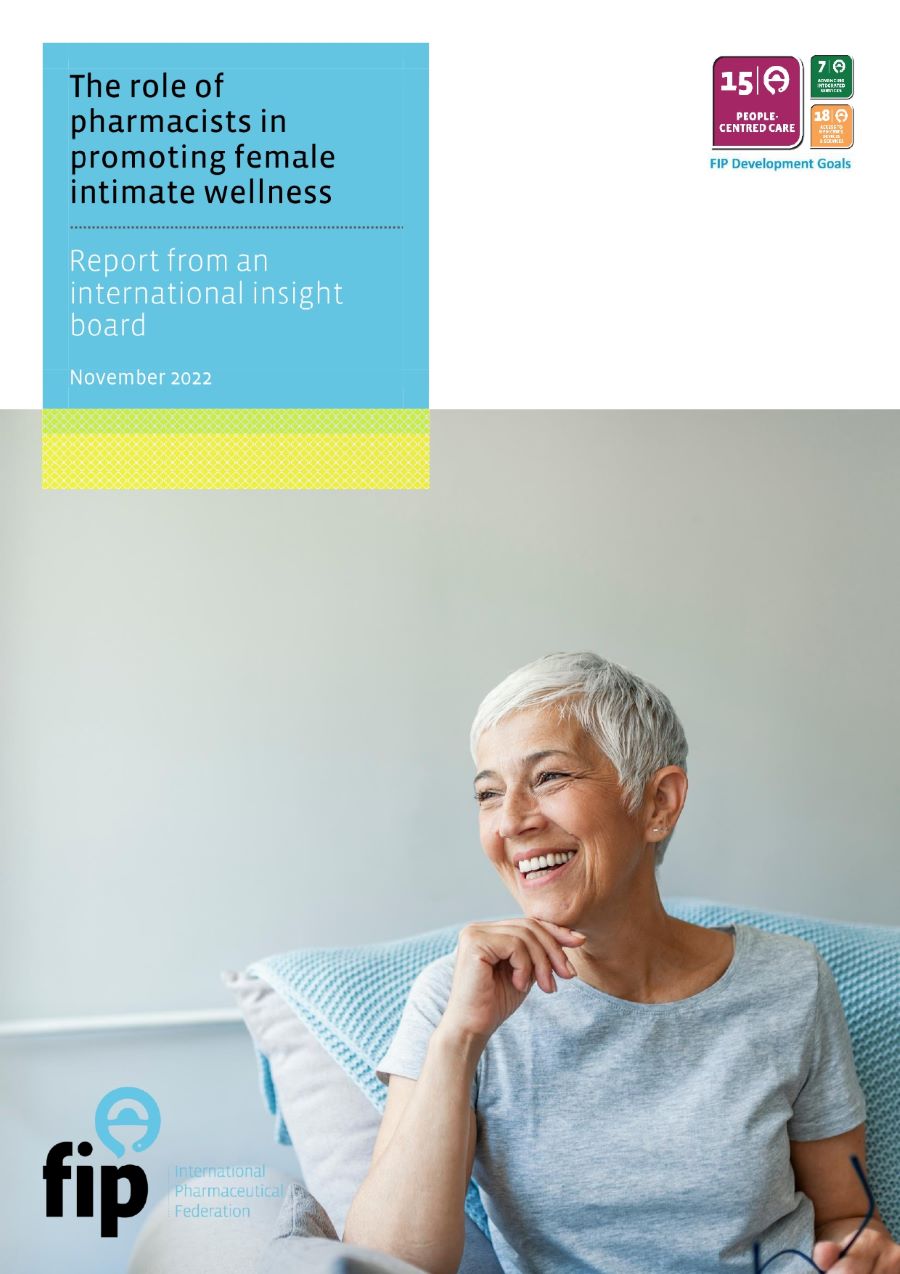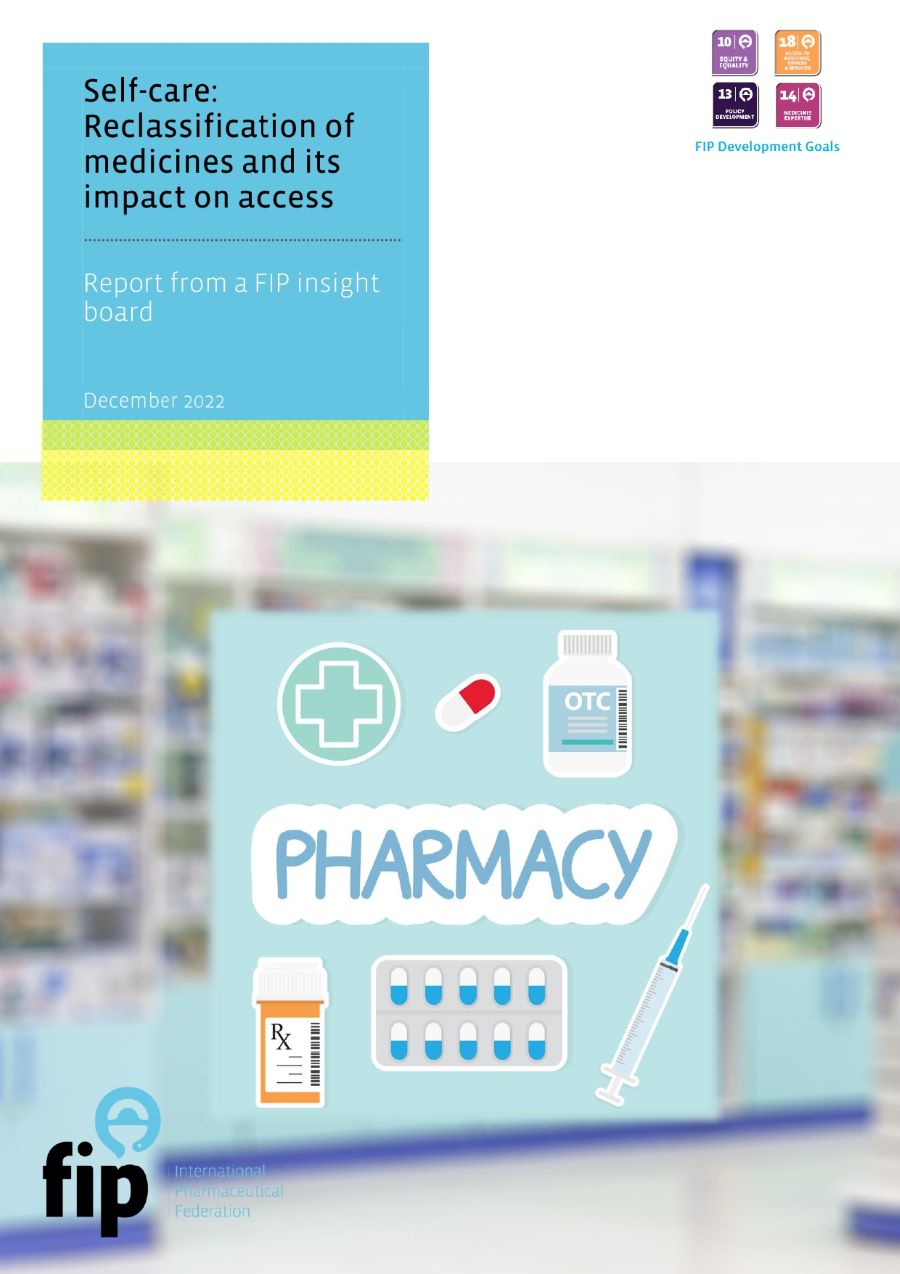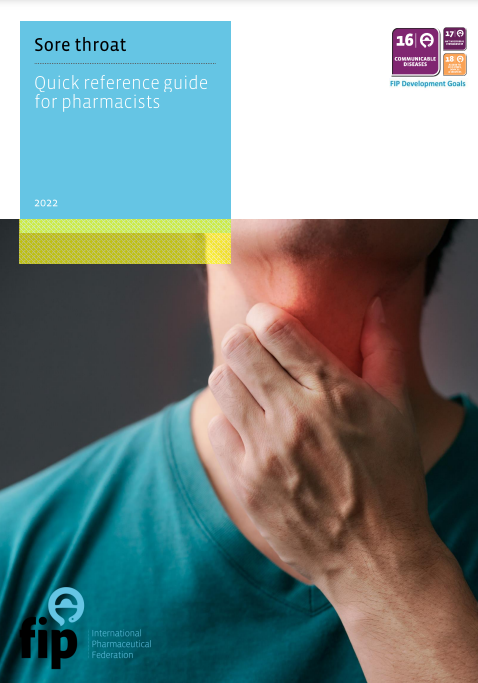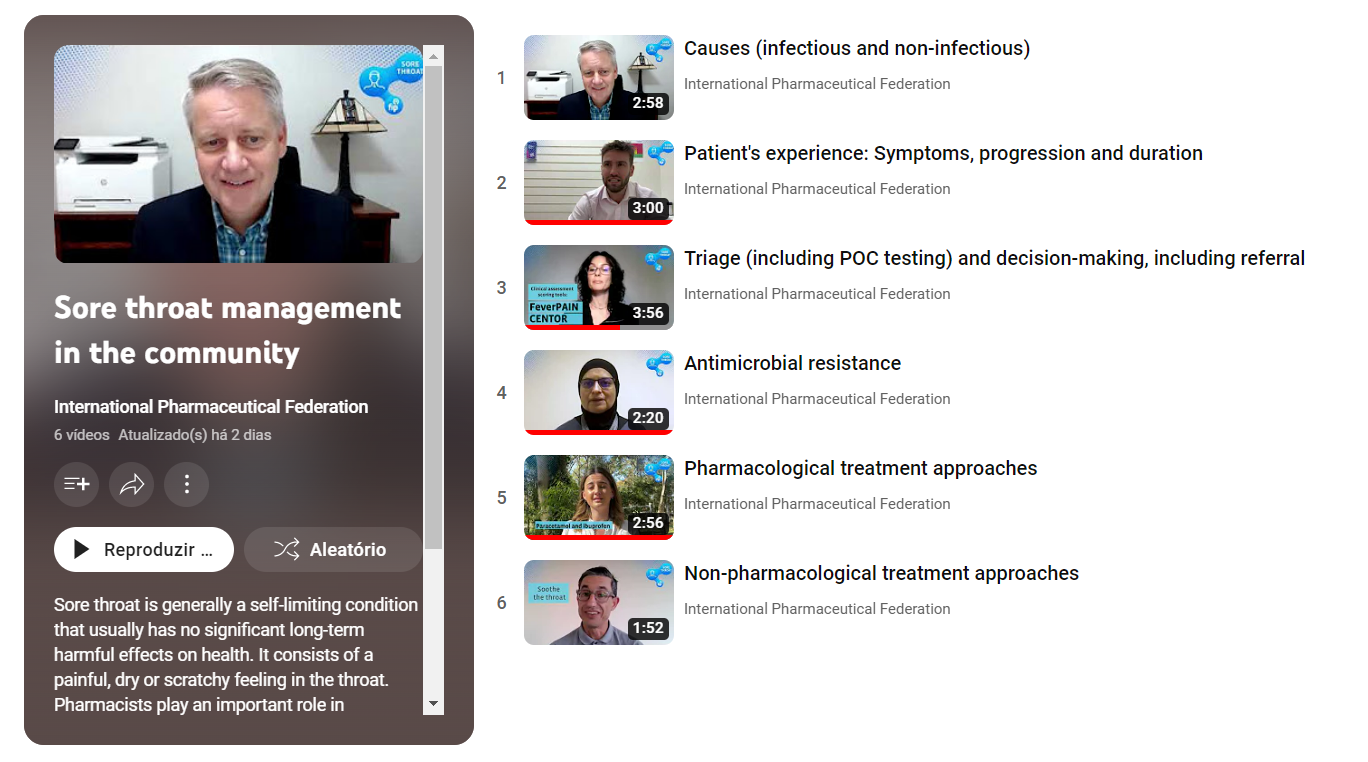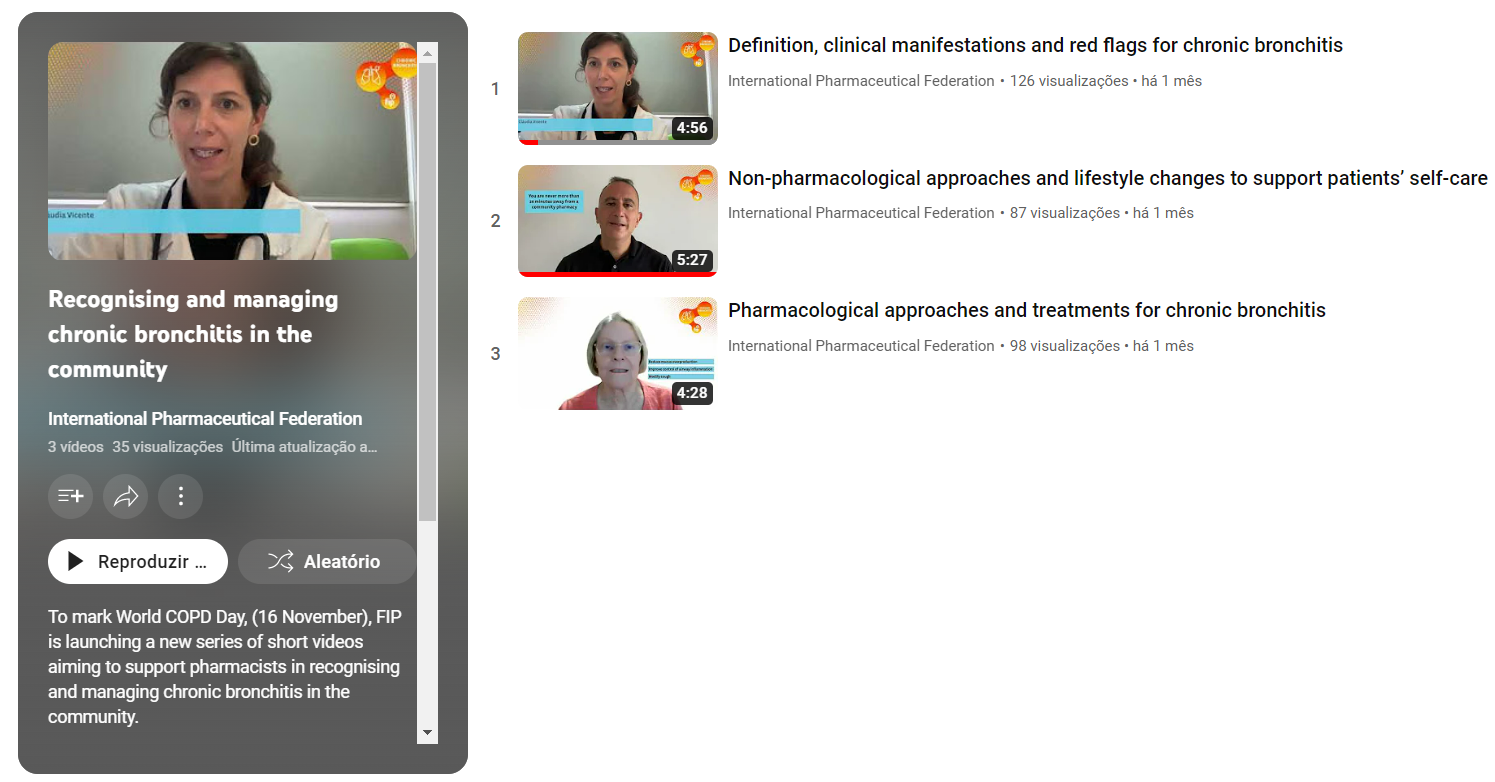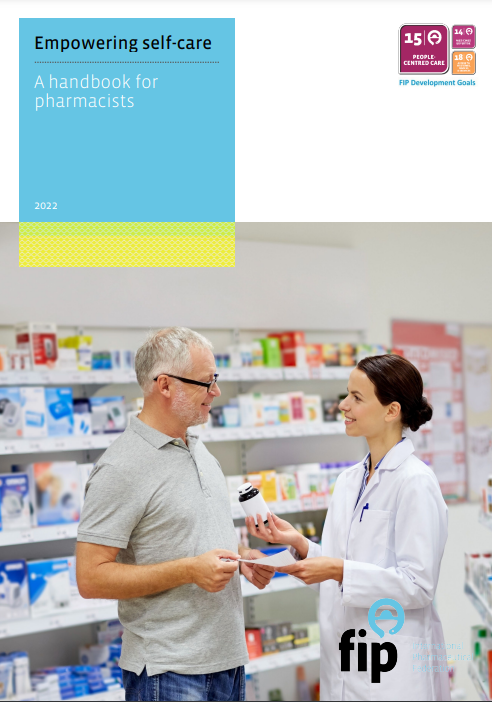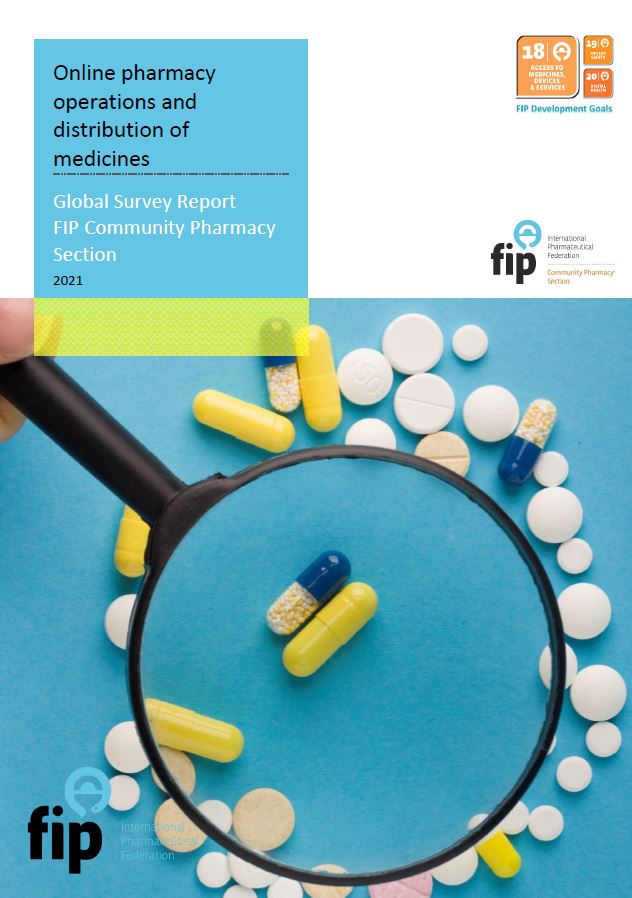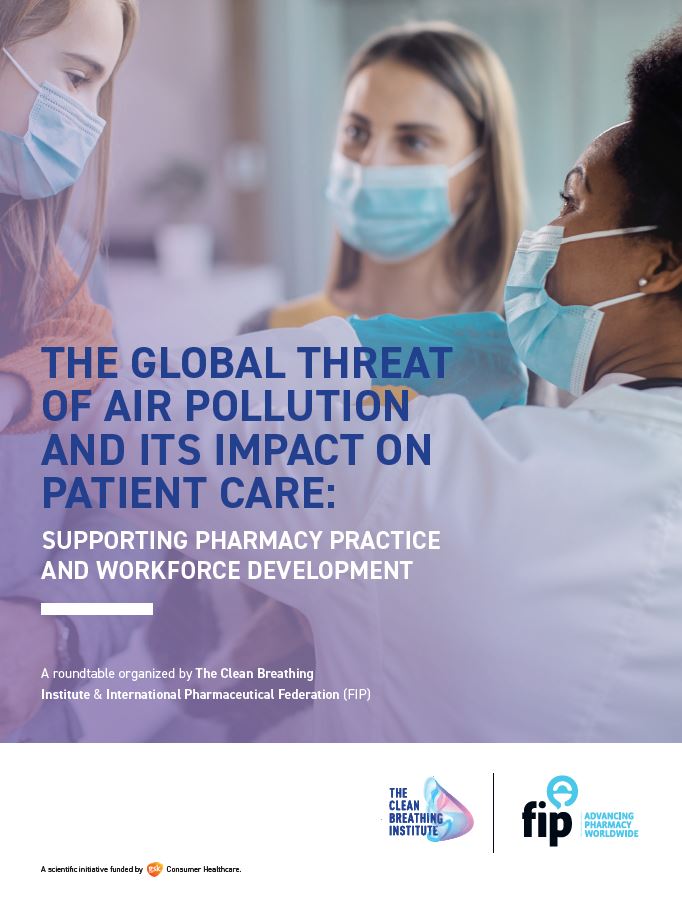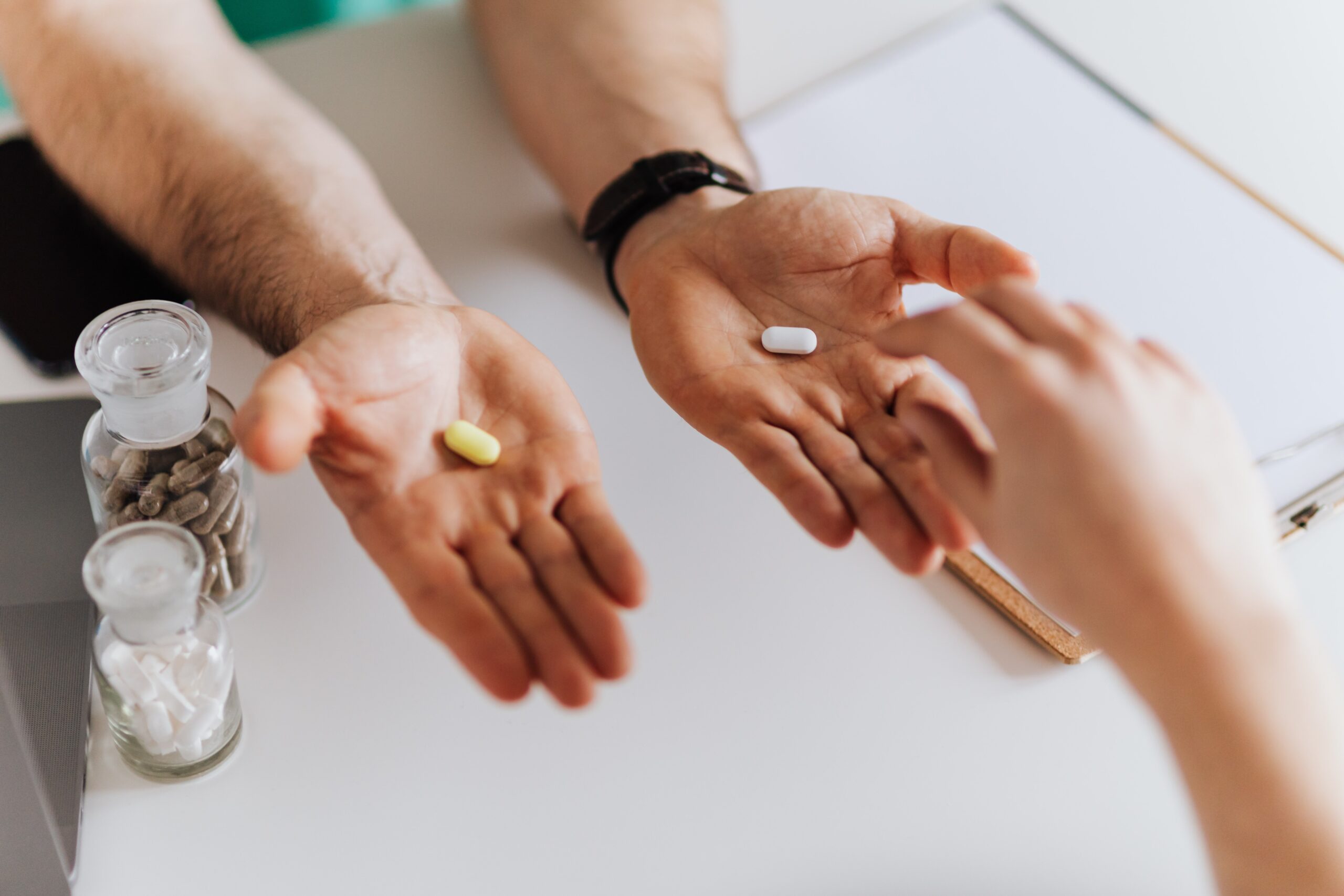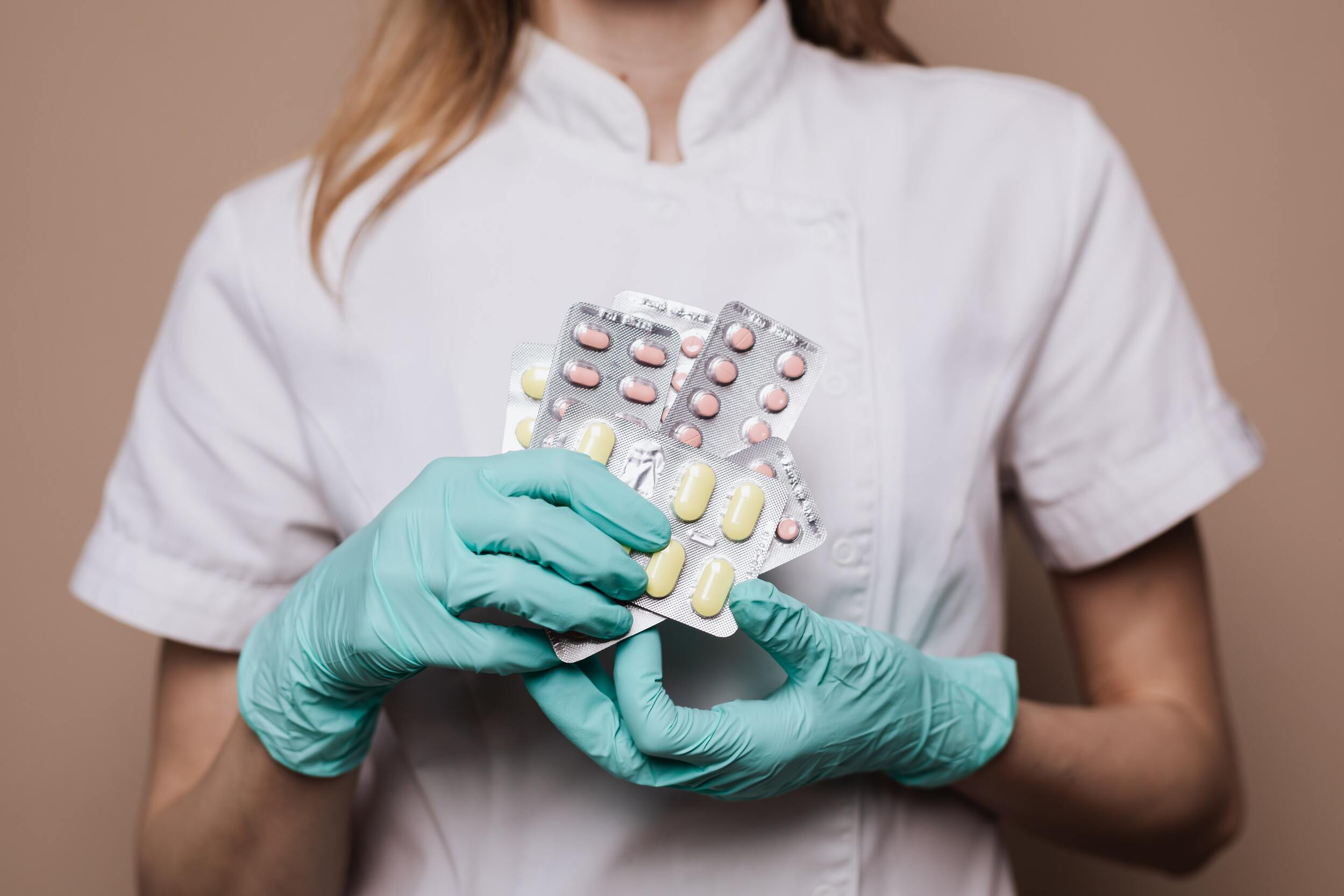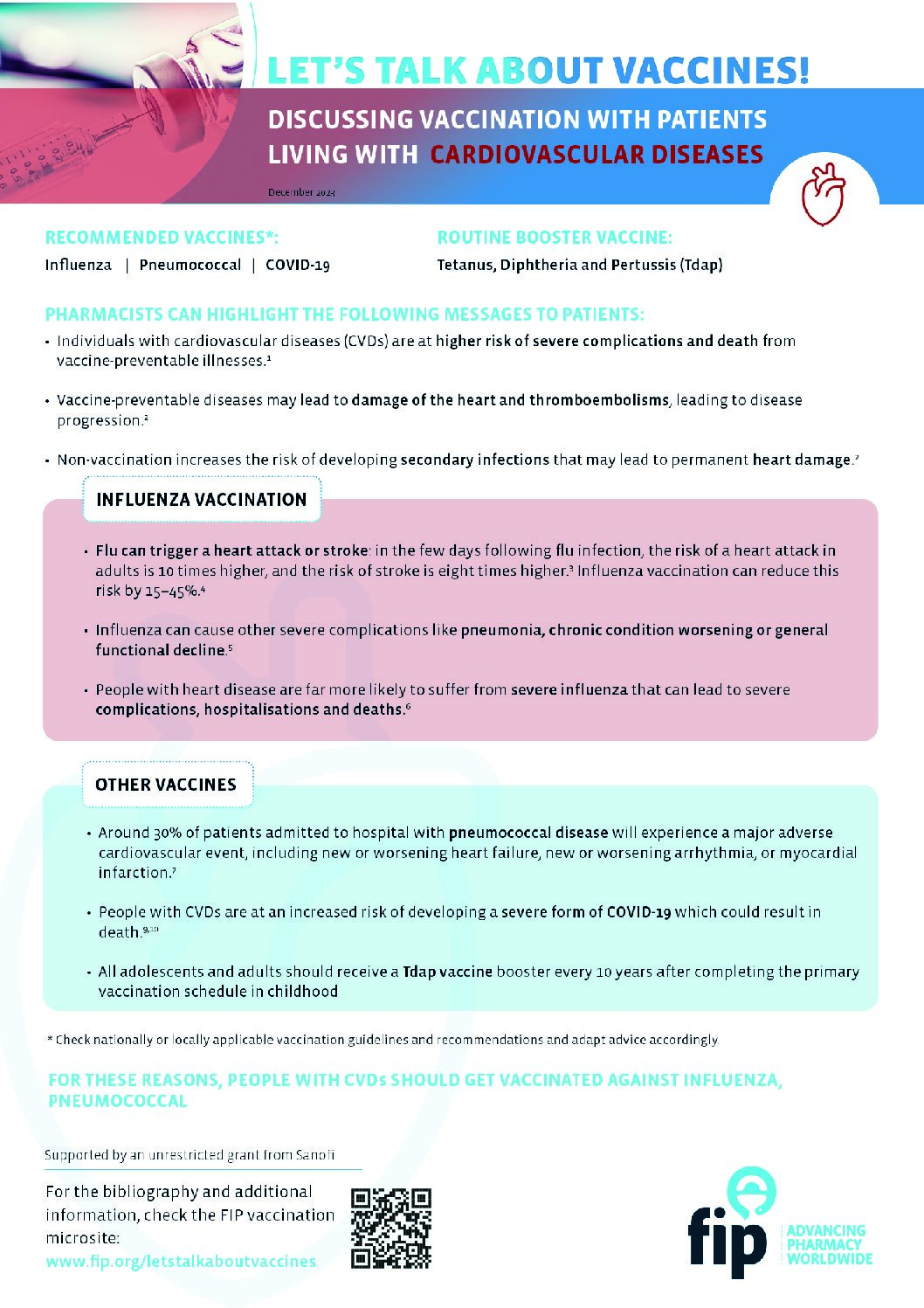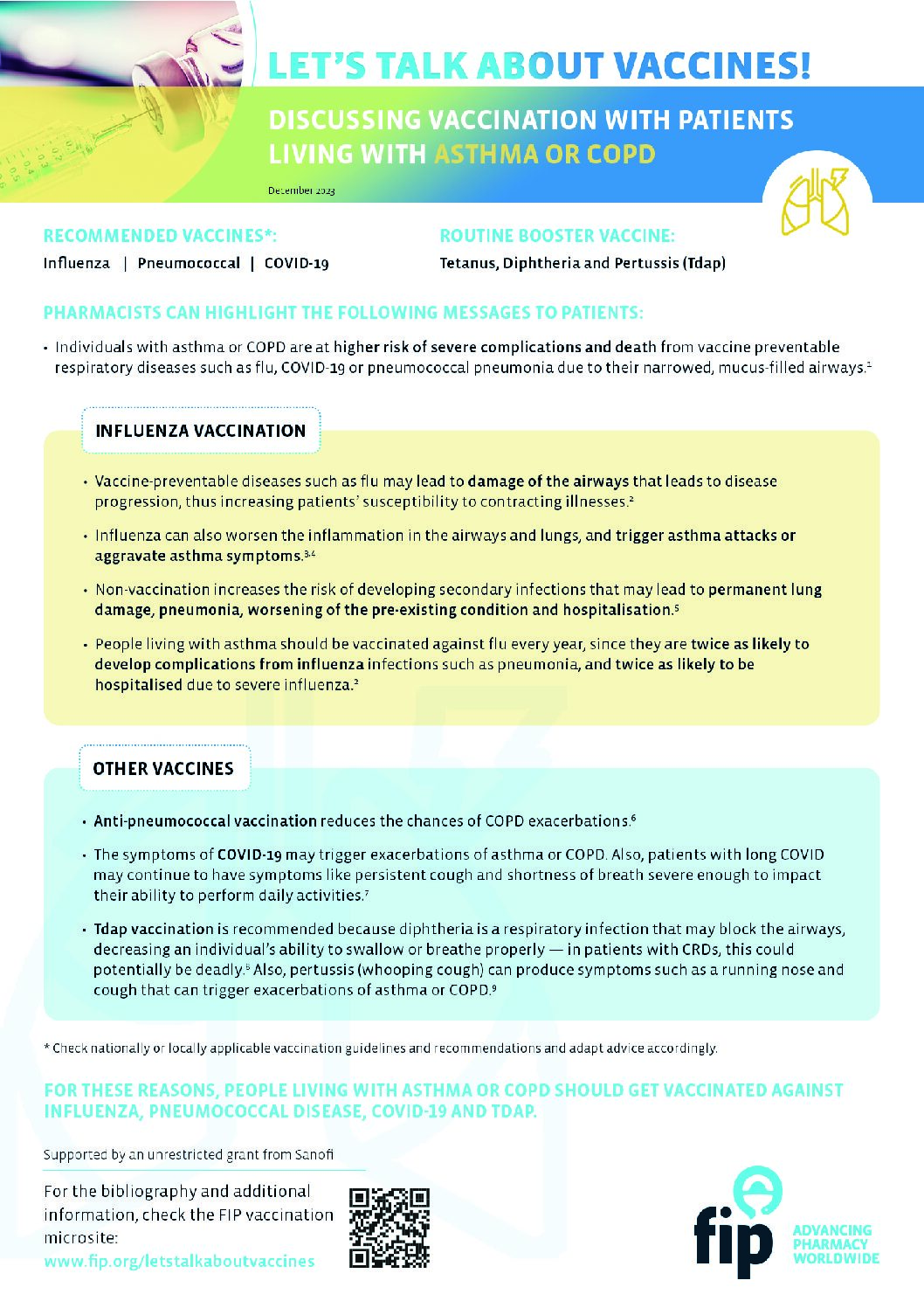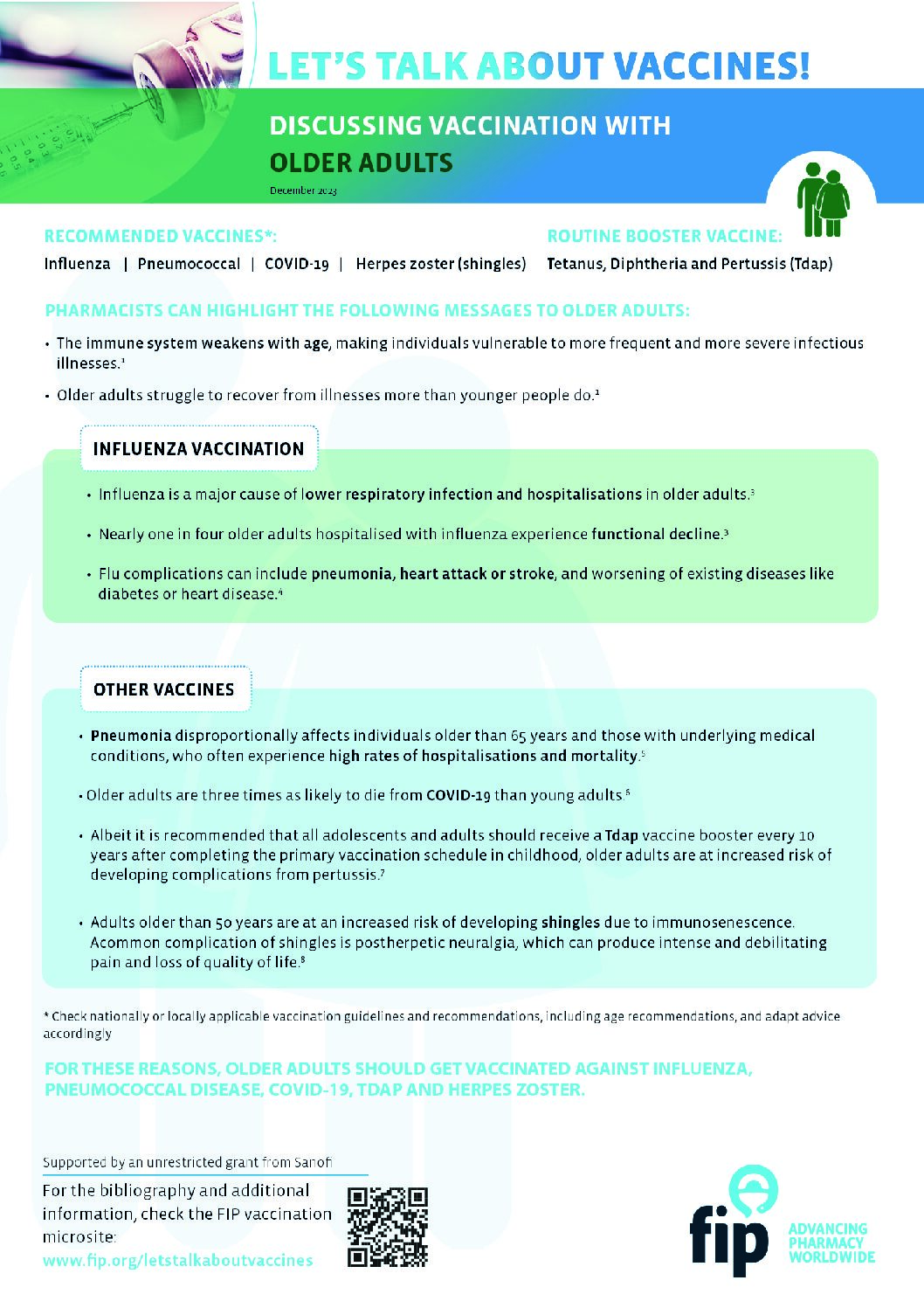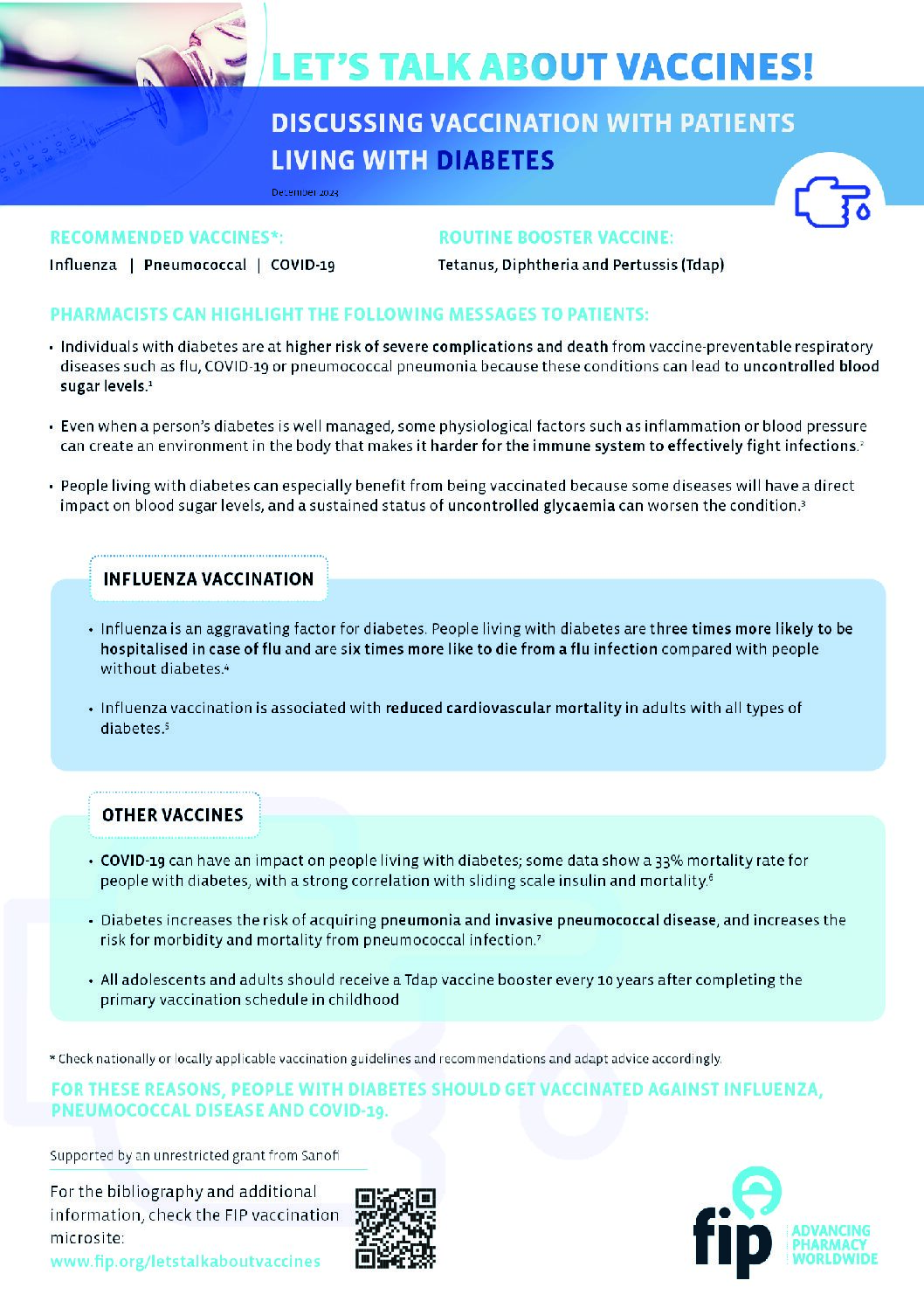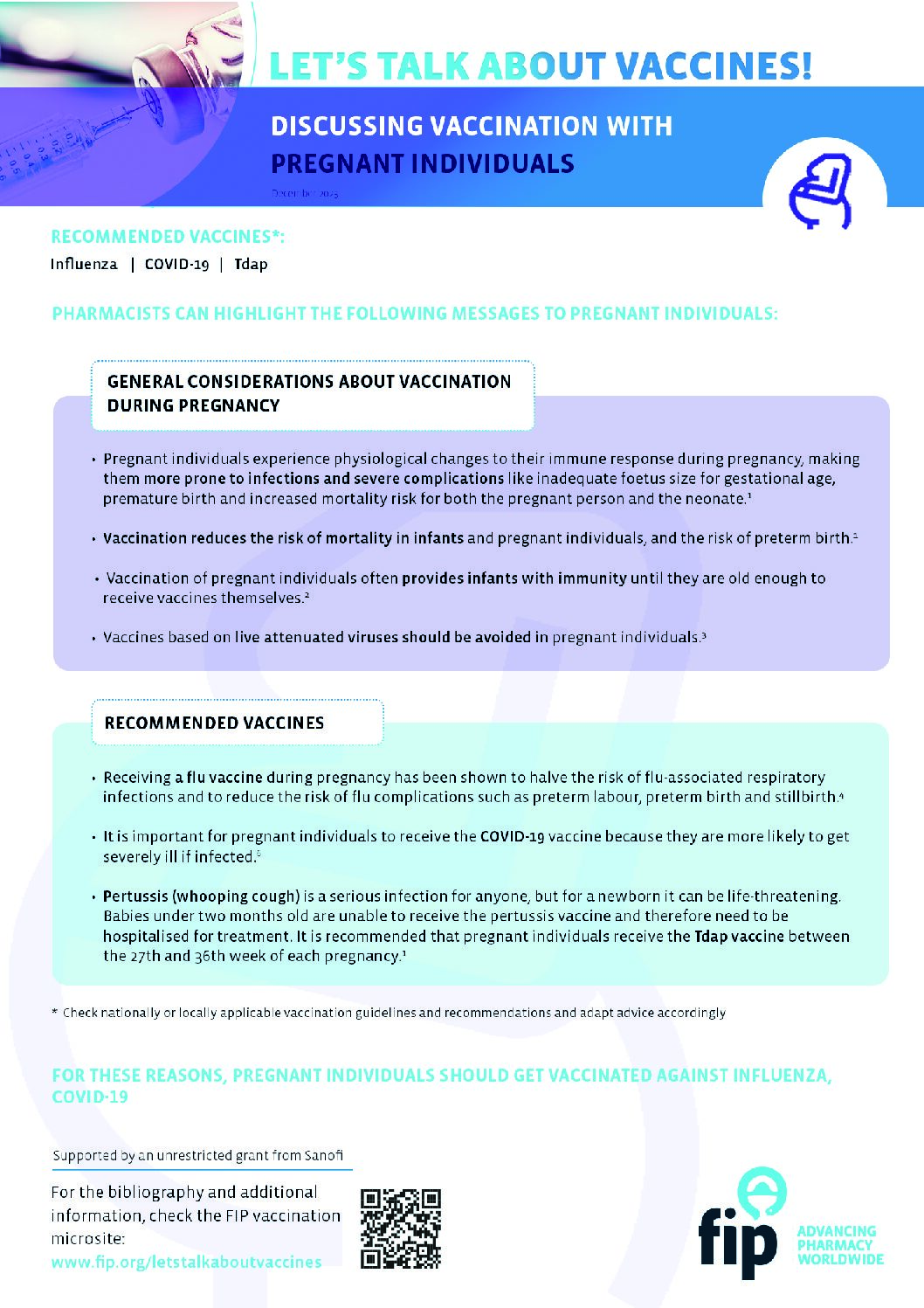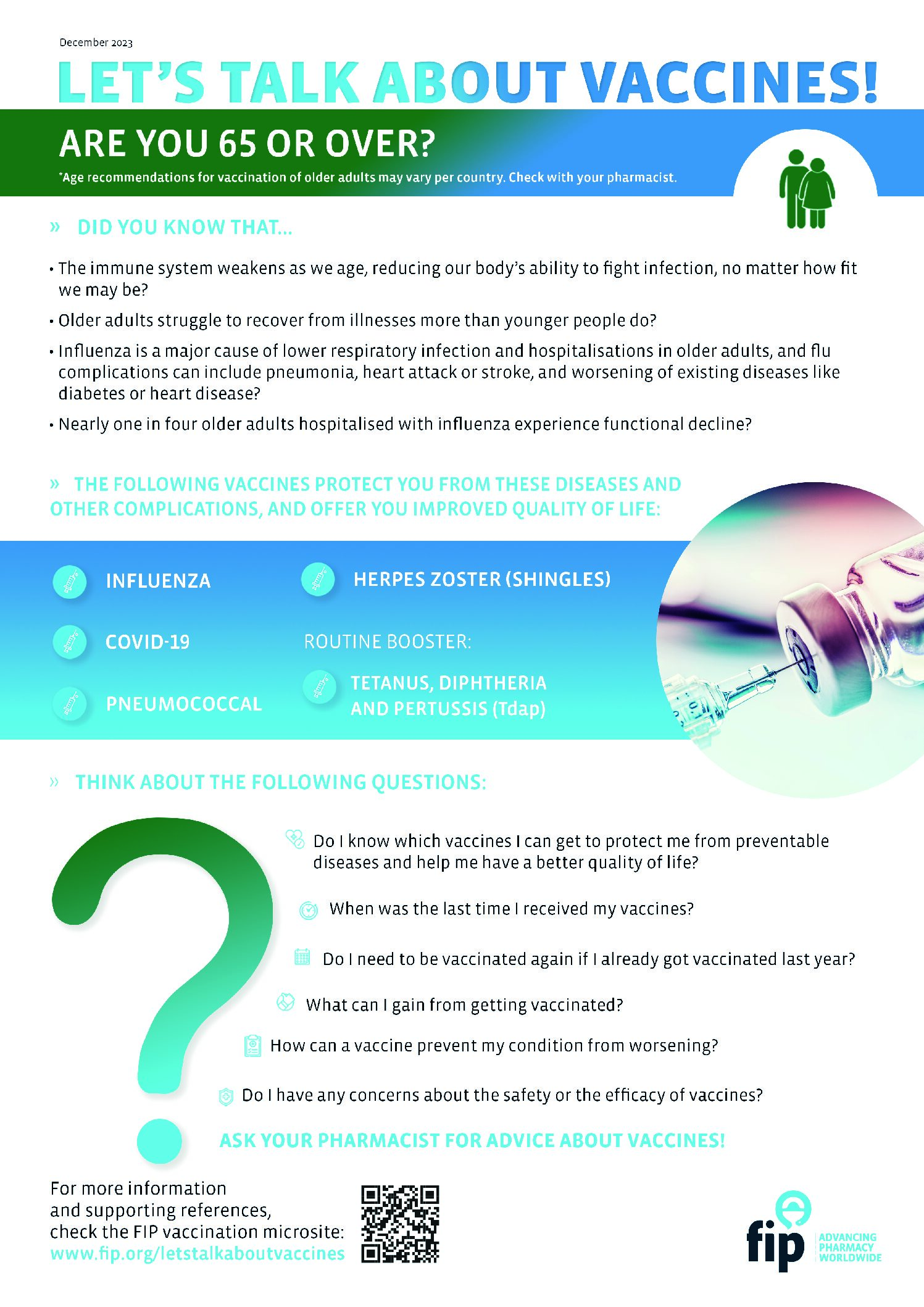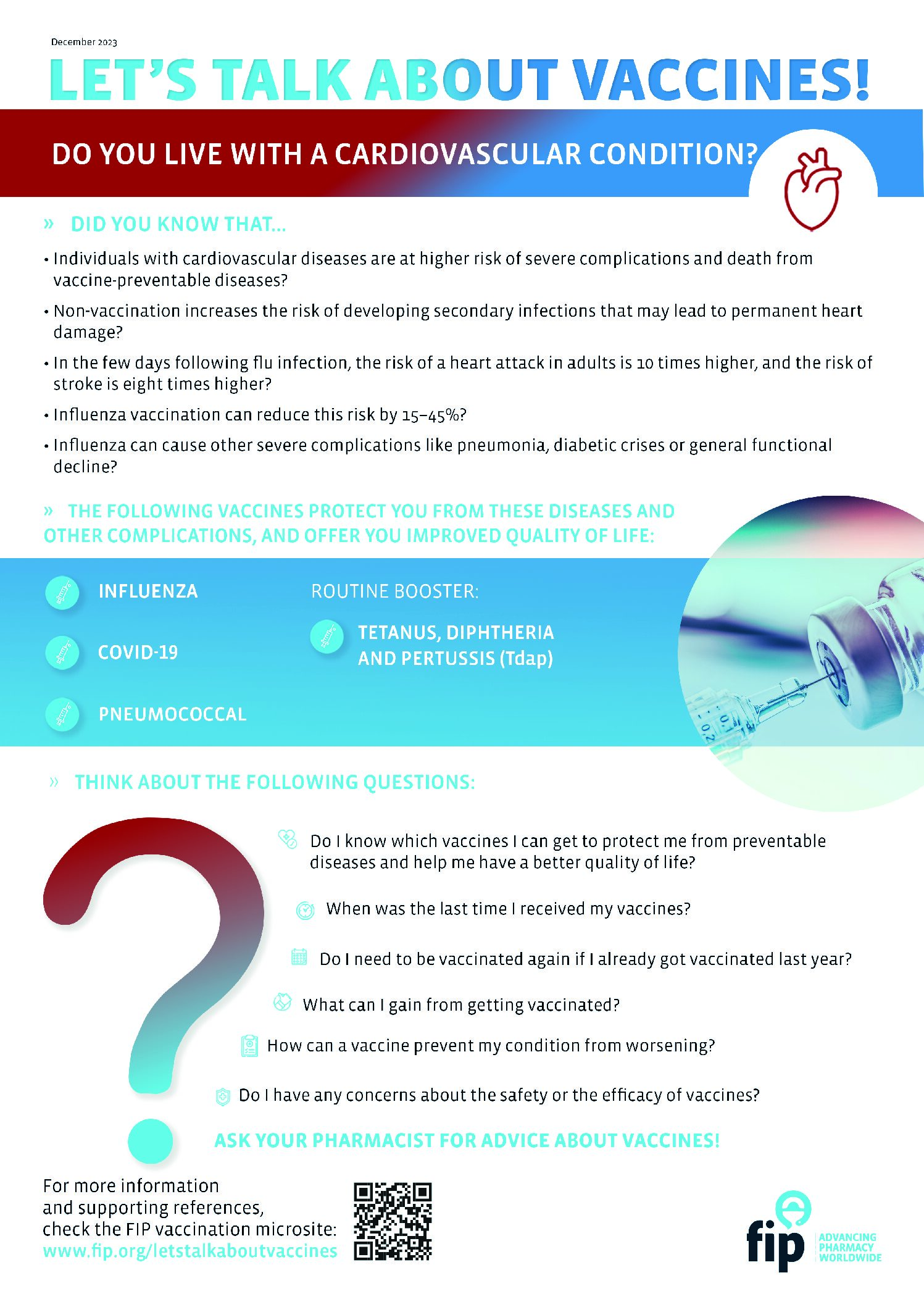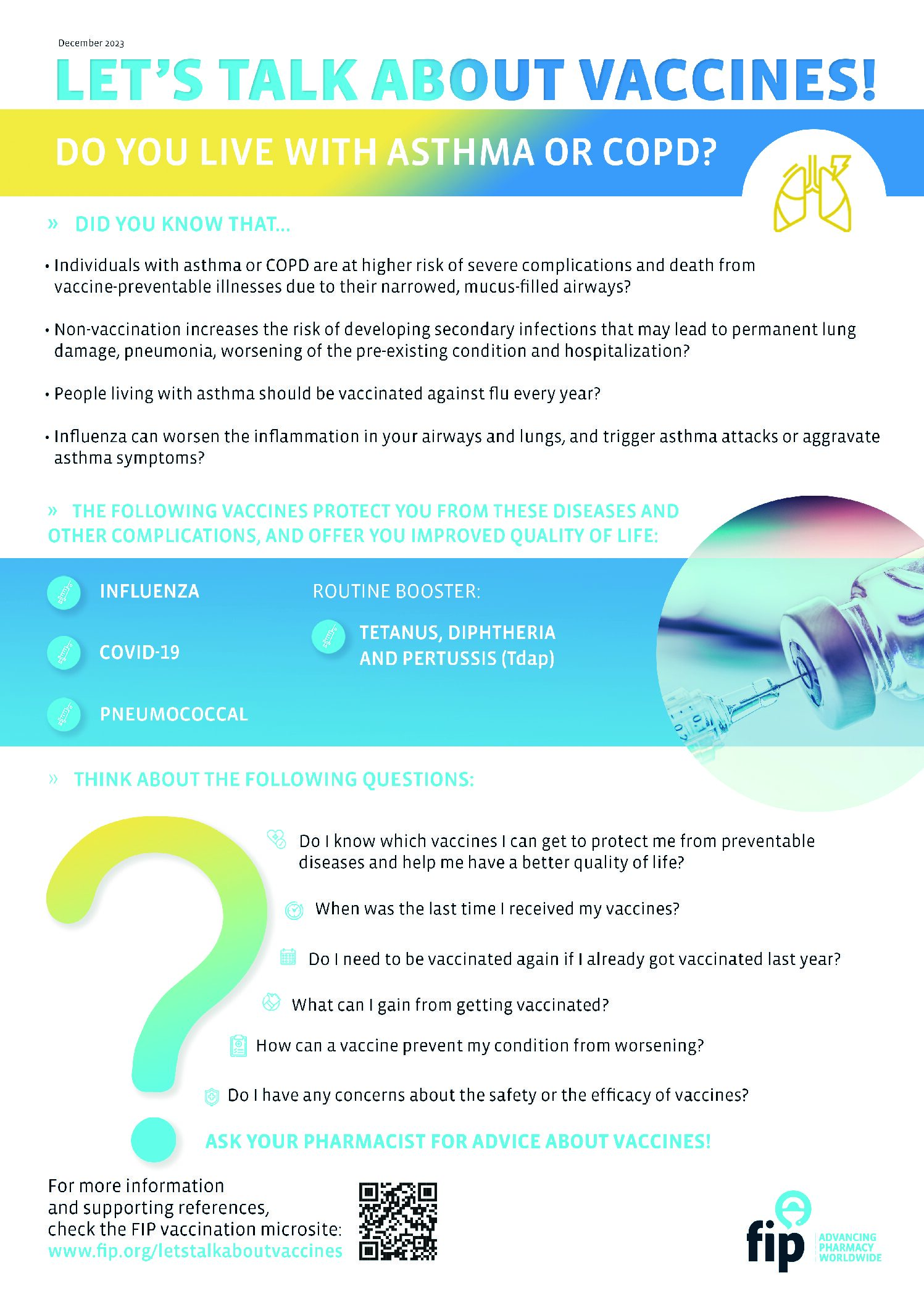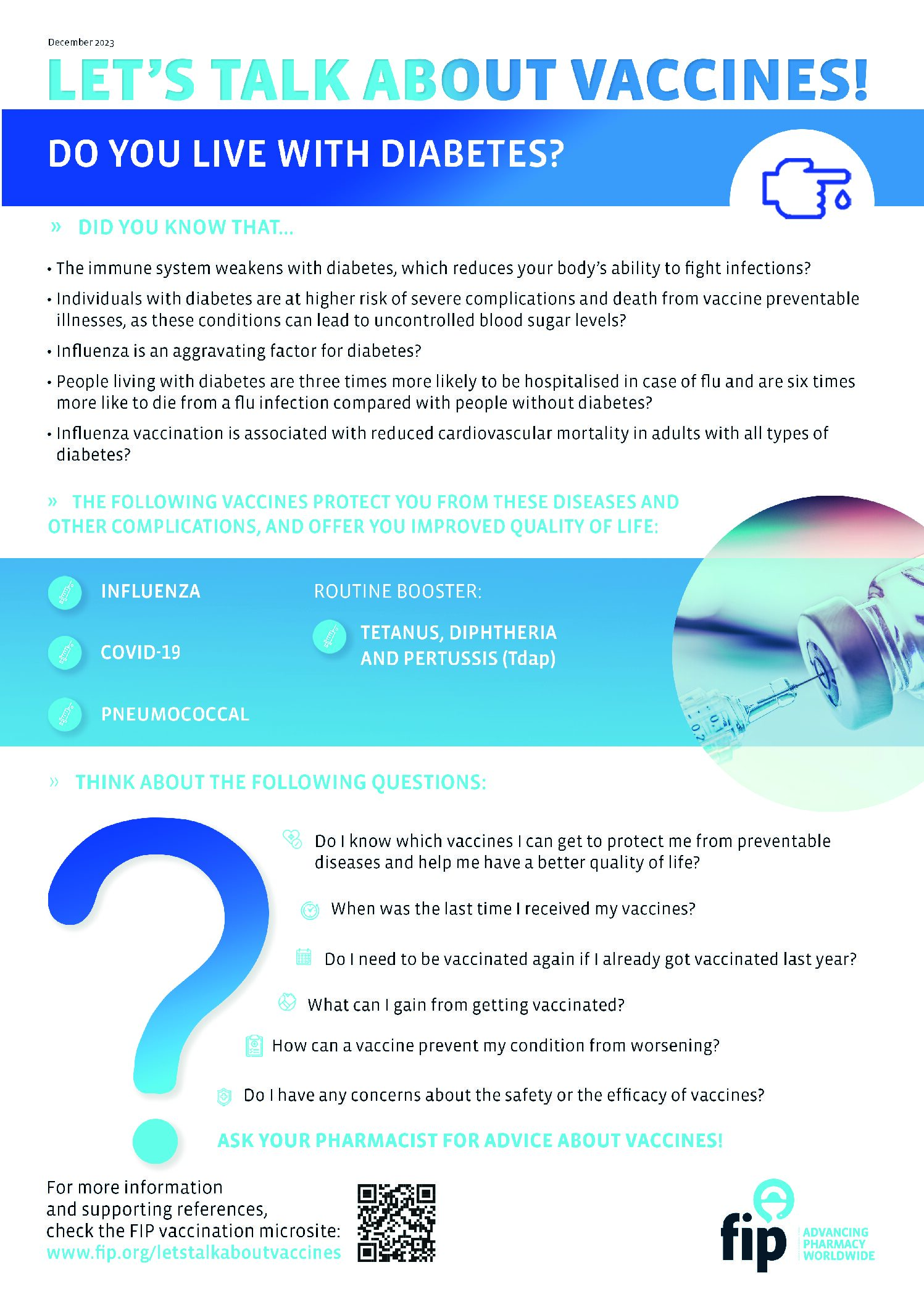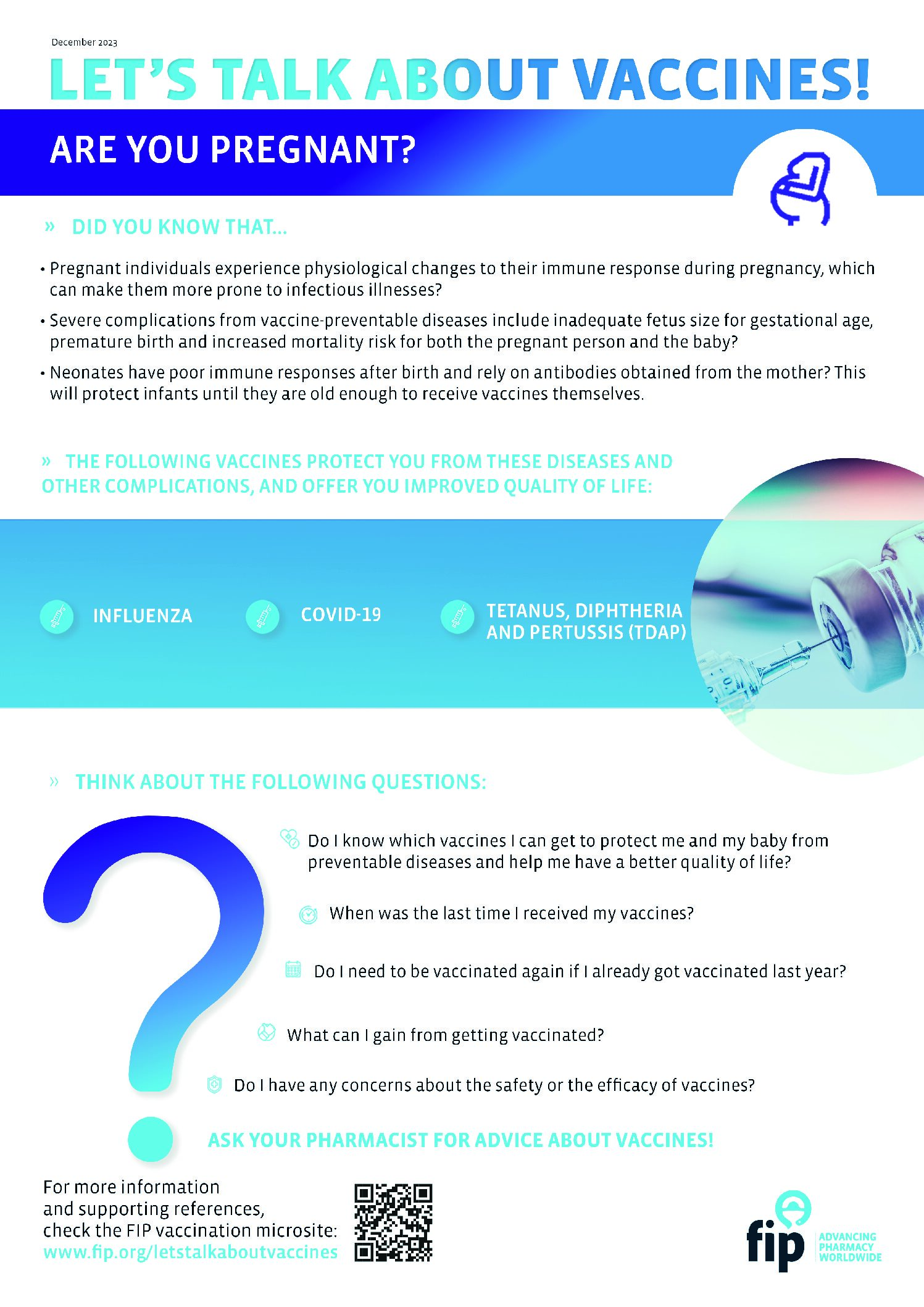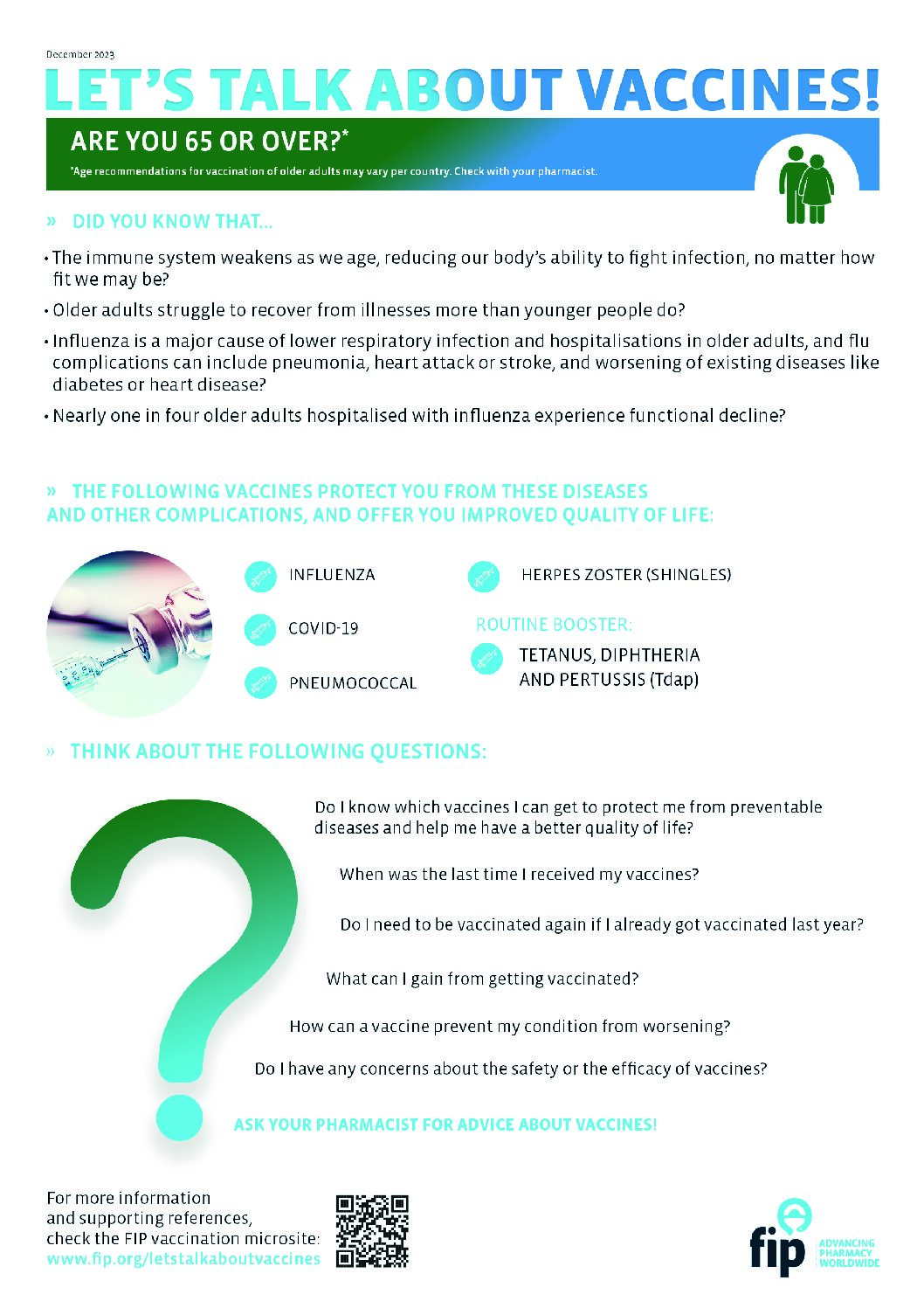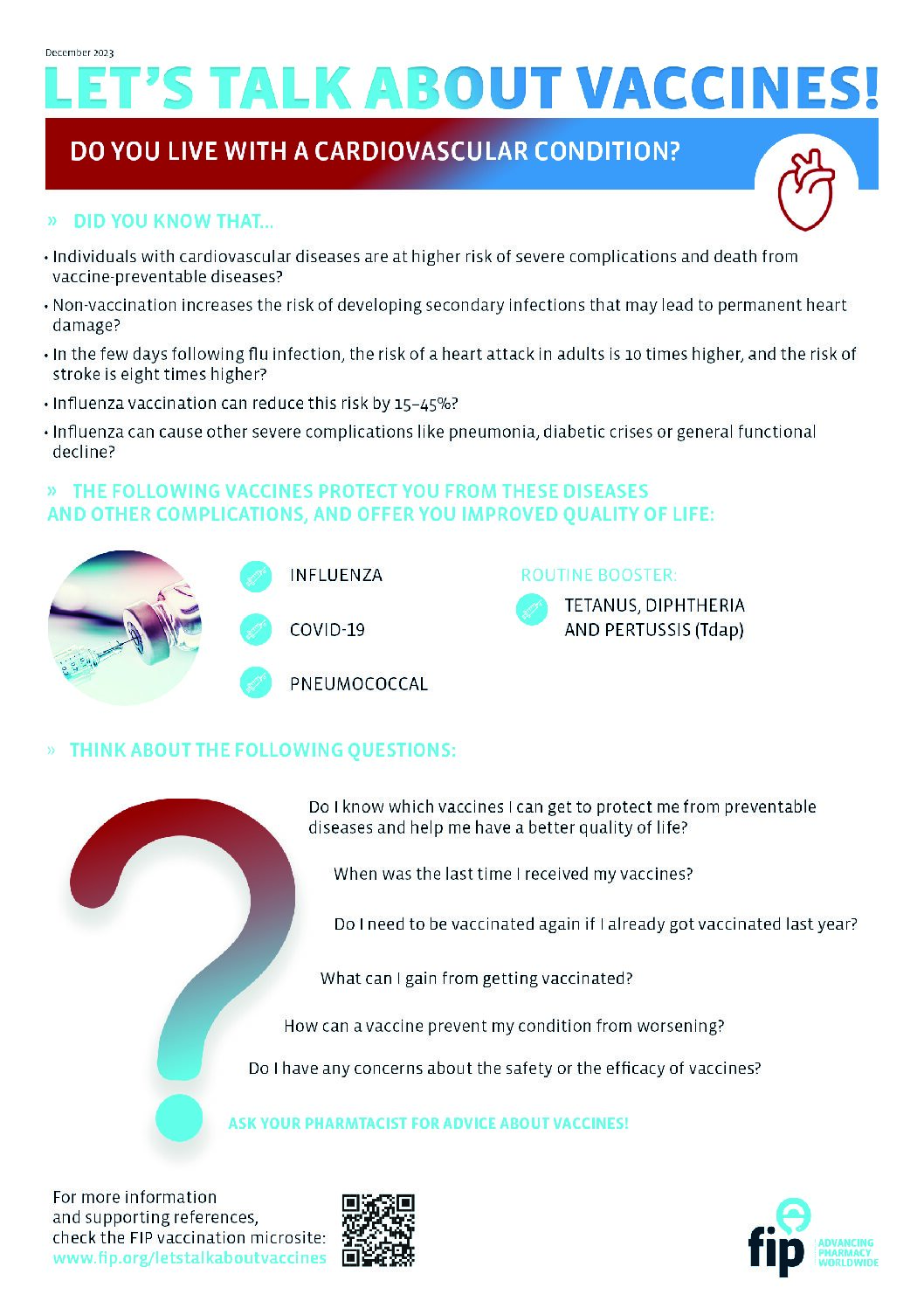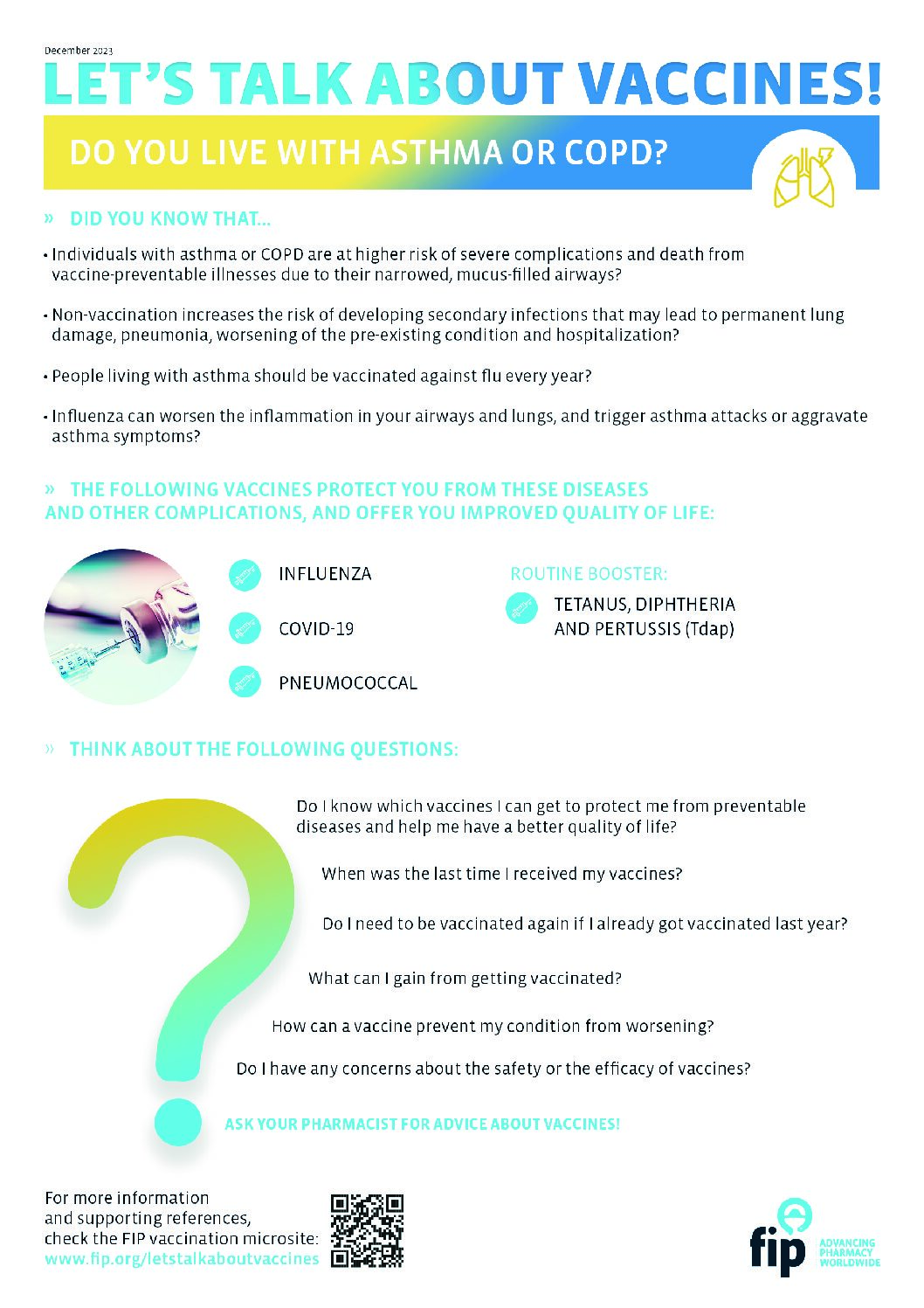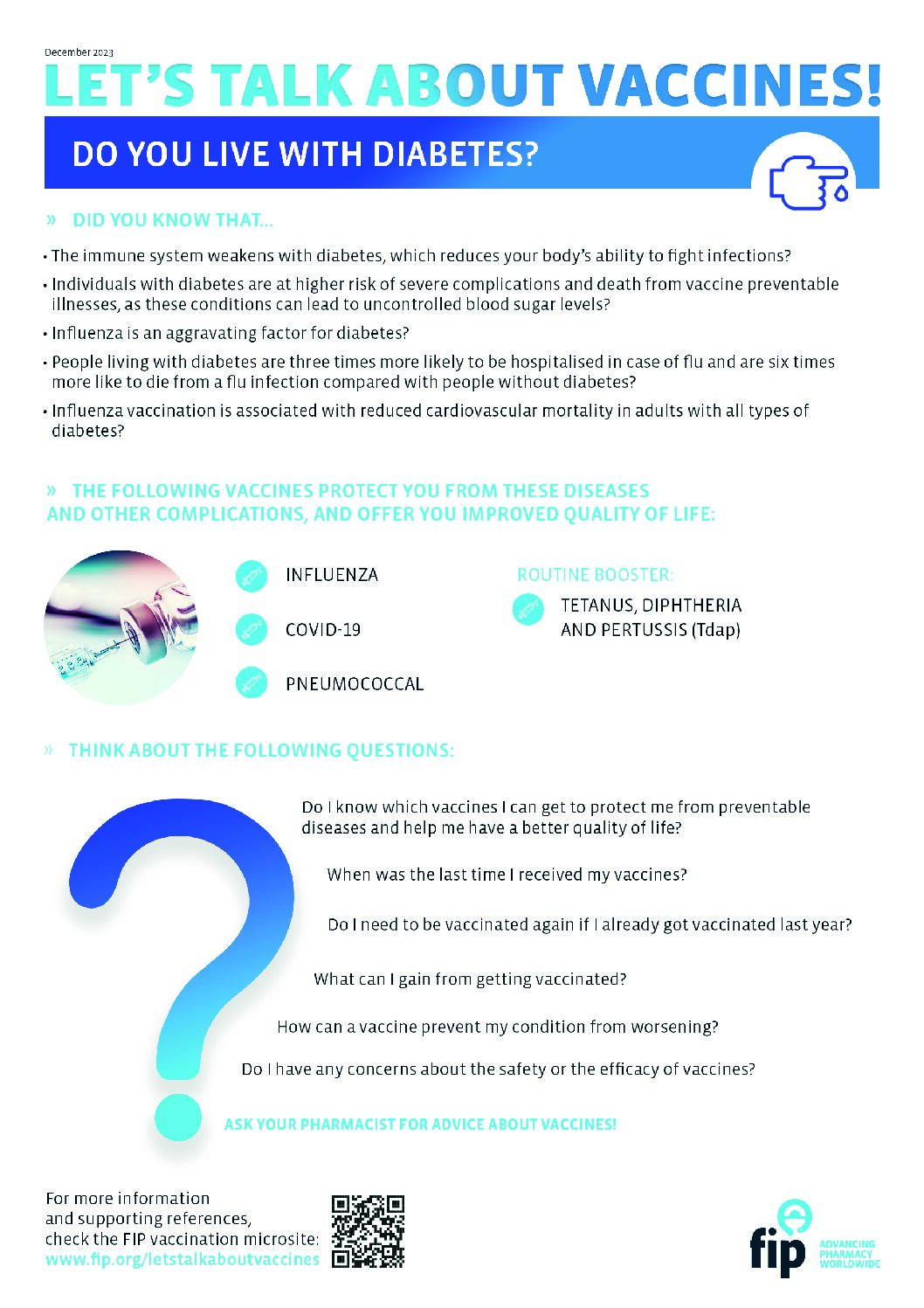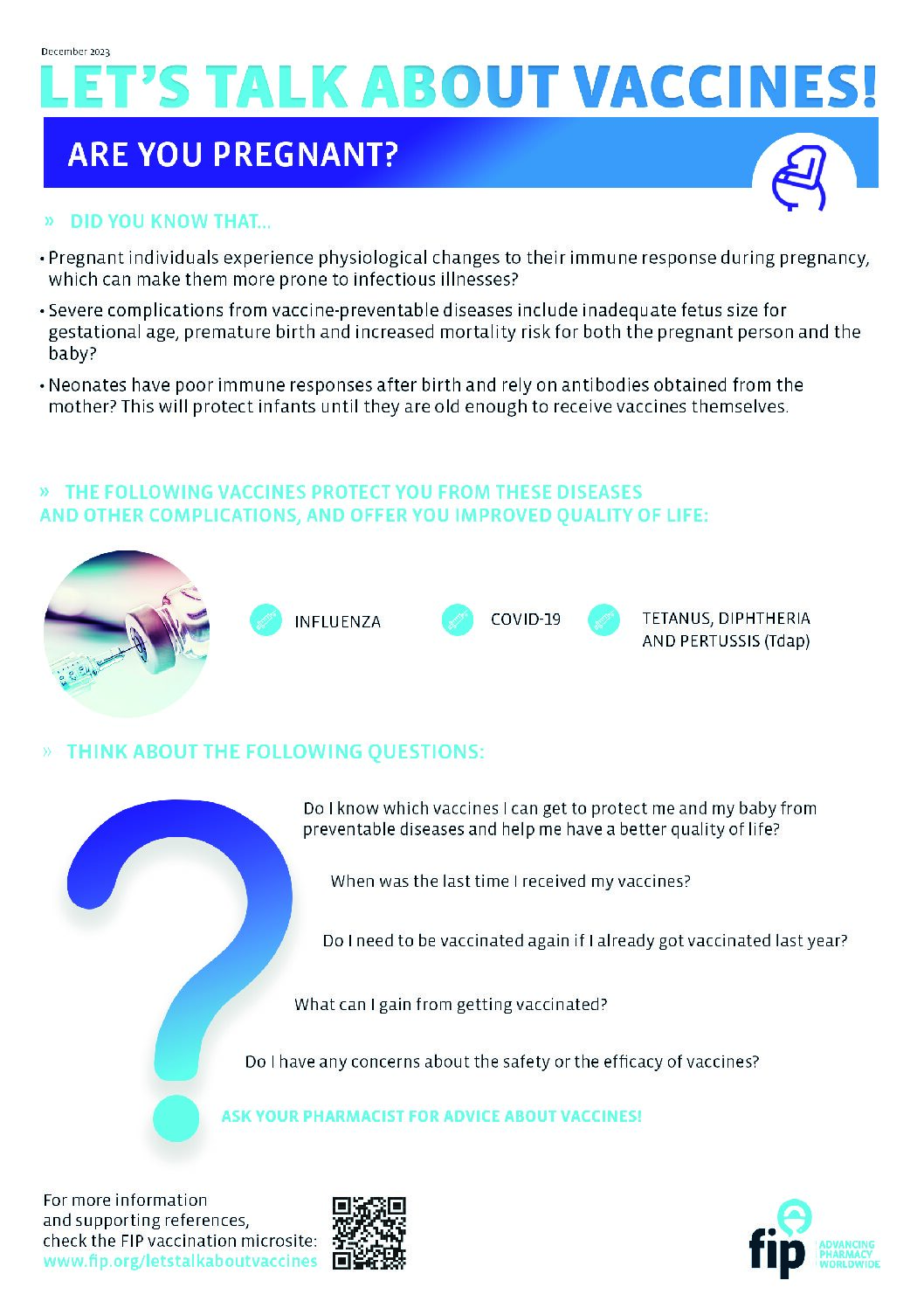Publications
Publications are presented in chronological order, from more recent to older. Please scroll down inside the grey area or using the scroll bar on its side to find more FIP publications.
CPD bites: A day in the life of a pharmacist supporting patients to self-manage common ailments (2023)
This series will deliver six episodes of CPD bites presenting experiences and views of six pharmacists, from six different countries/regions discussing pharmacists’ role and experience in supporting patients’ self-care/self-manage commonly experienced ailments such as common cold, sore throat, flu, reflux, skin infections, or urinary tract infections. The series will cover the importance of customer satisfaction; patient reassurance; patient loyalty; diagnostic service provision; patient empathy; counter staff training; patient triage; and interactions with physicians in self-care
Identifying pharmacy-led actions for improving health literacy: Report from an international advisory roundtable (2023)
Of FIP’s 21 Development Goals, FIP DG 10 (Equity and equality) impacts us all. It calls for clear strategies to address inequalities in the pharmaceutical workforce, as well as to widen access and equity of pharmaceutical care services and access, and equity in global capacity in pharmaceutical sciences development. Health literacy is one of the key factors for achieving health equity and equality, and it is universally acknowledged that low health literacy is a barrier to better health and to achieving inclusivity and equity in health. The COVID-19 pandemic has exacerbated and deepened existing health inequities and has also revealed that a large part of them is rooted in education and literacy levels.

Health inclusivity, agency and empowerment: Developing solutions to help pharmacists drive better health outcomes: Report from an international insight board (2023)
The United Nations Sustainable Development Goal 3 (Good health and well-being) seeks to “ensure healthy lives and promote well-being for all at all ages”. Achieving this goal and universal health coverage cannot be achieved without equitable and inclusive access to health care, in our case, pharmaceutical care.
A symposium with the theme “Health inclusivity and the role of pharmacy” took place during FIP’s 80th World Congress of Pharmacy and Pharmaceutical Sciences in Seville, Spain, in 2022. Equitable and inclusive access to health care is necessary if universal health coverage SDG3 are to be achieved. With the belief that pharmacists can meaningfully influence and improve health outcomes through inclusivity and inclusion, expert speakers from The Economist, leading pharmacists and academics discussed how pharmacy can play a leading role in driving health inclusivity
Enabling people-centred personalised care on pain in pharmacy: Report from an international roundtable (2023)
Delivering people-centred care is at the heart of pharmacy practice. FIP Development Goal 15 (People-centred care) emphasises the need to be able to deliver pharmaceutical care services for the prevention, screening, clinical management and therapeutic optimisation of non-communicable diseases (NCDs) and long-term conditions (LTCs). Pain management, in particular, is a critical area where pharmacists play a significant role, as highlighted in the FIP 2022 report entitled “Empowering self-care: A handbook for pharmacists”. However, despite the high incidence of pain, patients are often hesitant to discuss it. It is necessary to comprehend the reasons behind this reluctance and establish comprehensive communication between pharmacists and patients, leading to personalised pain management and improved clinical outcomes and self-care.
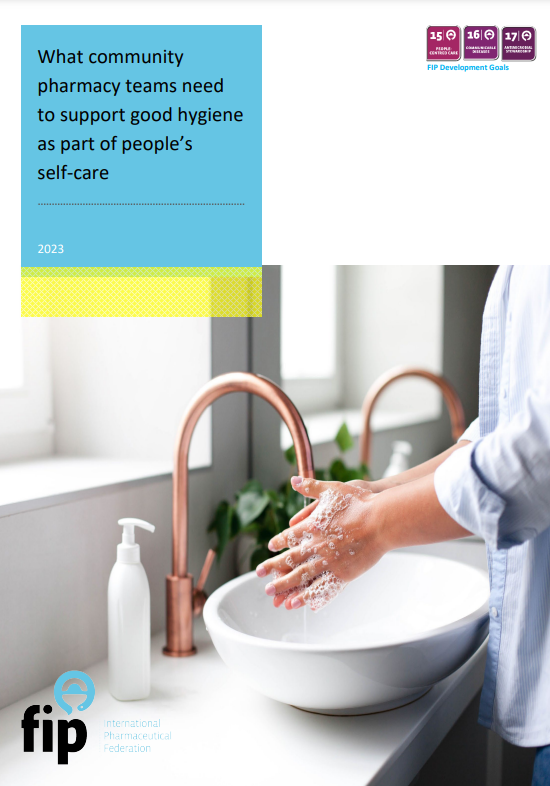
What community pharmacy teams need to support good hygiene as part of people’s self-care
Self-care is often thought of as what people do for themselves to establish and maintain health, and to prevent and deal
with illness. According to the World Health Organization, it is a broad concept encompassing nutrition (type and quality
of food eaten), lifestyle (sporting activities, leisure etc), environmental factors (living conditions, social habits etc),
socioeconomic factors (income level, cultural beliefs etc), self-medication and hygiene (general and personal).
This study, which took the form of an online questionnaire, aimed to describe community pharmacy insights into
hygiene and pharmacy teams’ role in addressing germ concerns of the public across India, Indonesia, Saudi Arabia, South
Africa and Thailand. The findings from our literature review showed that the concept of providing hygiene care advice has been differently shaped pre- and post-COVID times. Before the COVID-19 pandemic, the area of focus was limited to oral hygiene. All
studies reviewed in the literature reinforced the vital role of community pharmacists as the public’s first choice of
healthcare provider in mitigating the spread of the disease as well as their prominent contribution to overall emergency
management. There was also an unequivocal need to support, train and educate community pharmacists and their
teams to improve their knowledge because the concept of increasing personal hygiene awareness is a focus area of
community pharmacists in developed and developing countries.
The role of pharmacists in managing reflux-like symptoms: Report from an international insight board
Read Publication
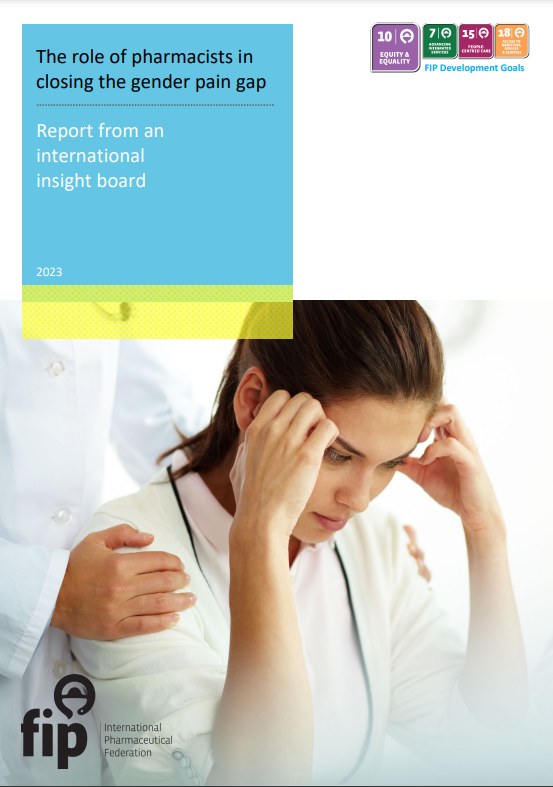
The role of pharmacists in closing the gender pain gap: Report from an international insight board
This report outlines the insights, potential lessons learned and ideas for ways forward for the pharmacy profession
regarding the gender pain gap. The issues were discussed at the FIP insight board on the gender pain gap organised at
the FIP Congress 2022 in Seville, Spain.
The insight board collected views from experts on the following topics:
• Pharmacists’ awareness of gender inequalities in pain research;
• Pharmacists’ awareness of gender gaps in treatment offers for pain management;
• Pharmacists and unconscious bias towards women in pain management;
• Knowledge, attitudes and practices that pharmacists have to close the gender pain gap; and
• How pharmacists can be supported with, for example, training, tools to address gender inequalities in pain
management, closing the gender pain gap and achieving behavioural change towards women.
The participants considered various issues and questions during the meeting:
• Identifying pain symptoms and the influence of gender in pain management;
• Pharmacists’ knowledge and training status on unconscious bias towards women in pain management;
• Knowledge, attitudes and practices that pharmacists have and can develop further to close the gender pain
gap; and
• How to support pharmacists to address gender inequalities in acute pain management, close the gender
pain gap and change approaches towards pain in women.
The literature was evaluated beforehand and key available research findings were extrapolated. Then, discussions were
focused on the areas above, recorded and reported in this document. Insights from the participants and any quotes
published in this report remain anonymous and non-attributable.
Managing reflux symptoms in the community pharmacy: Quick reference guide for pharmacists
This publication provides a quick review of guidance on reflux management by community pharmacists, expanding on the previous FIP publication “Empowering self-care: A handbook for pharmacists”. An overview of the causes, symptoms and management options for reflux management will be detailed, including resources and highlighted information for the pharmacy team.
The role of pharmacists in promoting female intimate wellness: Report from an international insight board
Read Publication
Self-care: Reclassification of medicines and its impact on access
Read Publication
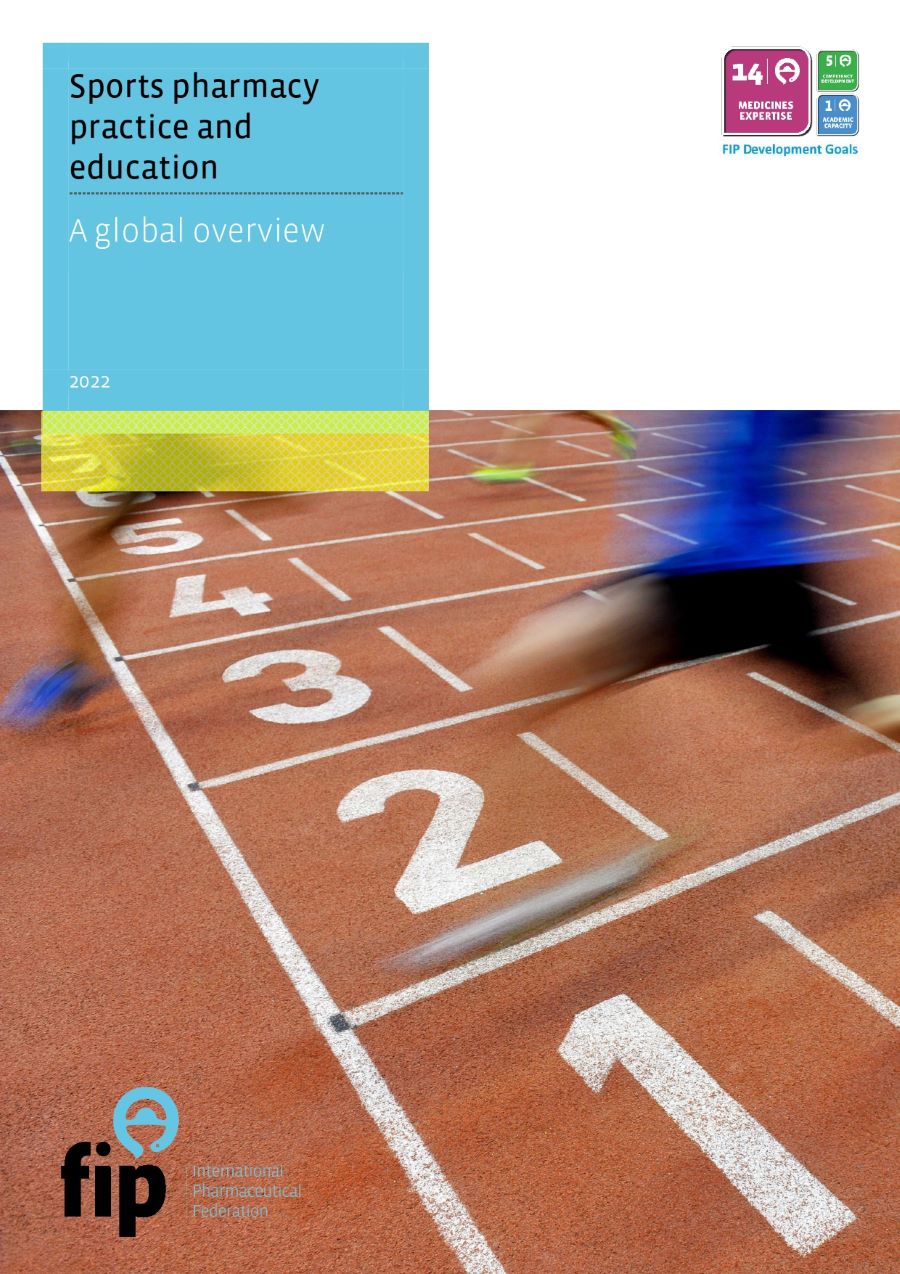
Sports pharmacy practice and education: A global overview
Inspired by the athletes themselves, their athleticism, and the spirit of competitive sport, pharmacists have
become key players as athlete support personnel (ASP). As ASP, pharmacists support appropriate medication
selection and provision of medicines management in the healthcare of athletes and pharmacy operations of
sporting events. Increasingly recognised within the world of sports as a valuable expertise, the practice is
known as “sports pharmacy”. The specialty of sports pharmacy is no longer a niche area but is one gaining
traction as a recognised specialty on a global scale. Sports pharmacists advocate the health of recreational or
competitive athletes in many settings and have been integral to the anti-doping movement. Pharmacists, as
the most accessible healthcare provider, and often a first point of contact in the self-care continuum, have a
unique and important role in providing accurate medicines-related information to athletes and the athlete
support team to avoid inadvertent doping and adverse drug events, and support and review appropriate
prescribing where applicable. This requires awareness of sports science, anti-doping rules and regulations,
and physiopharmacology. Initial training through undergraduate studies and advanced training through
continuing professional development in these areas facilitate pharmacist competency to function as ASP.
Sore throat: Quick reference guide for pharmacists
Sore throat is one of the most common upper respiratory tract infections for which antibiotics are used inappropriately. This quick reference guide covers causes, triage, and pharmacological and non-pharmacological treatments, and it provides links to further resources.
Videos: Sore throat management in the community
Sore throat is generally a self-limiting condition that usually has no significant long-term harmful effects on health. It consists of a painful, dry or scratchy feeling in the throat. Pharmacists play an important role in supporting self-care in cases of sore throat and can thus avoid patients’ unnecessary use of other healthcare resources and the unwarranted use of antimicrobials. This series includes six videos on different aspects of sore throat management, from causes and symptoms, to triage and pharmacological and non-pharmacological treatment options
Videos: Recognising and managing chronic bronchitis in the community
To mark World COPD Day, (16 November), FIP is launching a new series of short videos aiming to support pharmacists in recognising and managing chronic bronchitis in the community. Chronic bronchitis is included under the umbrella term COPD (chronic obstructive pulmonary disease), and has numerous clinical consequences, such as predisposition to lower respiratory tract infections, accelerated decline in lung function, and decreased health-related quality of life. Chronic bronchitis can be common and can go unrecognised and undiagnosed at the early stages. Identification, advice, management and referral are all ways in which pharmacists can play a role.
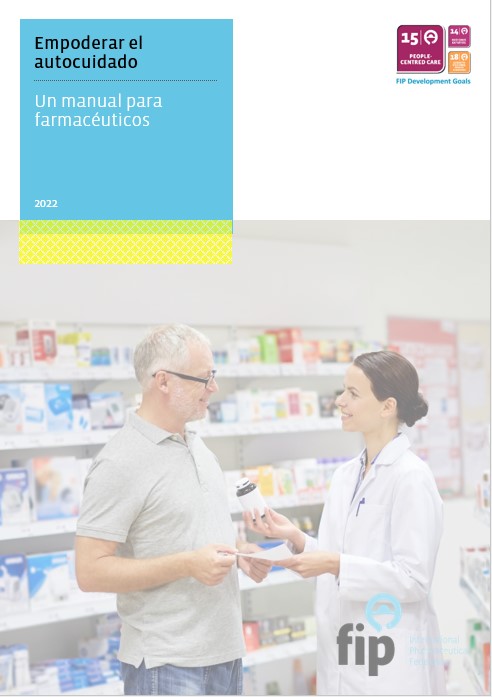
Empoderar el autocuidado: Un manual para farmacéuticos
Apoyar y facultar a las personas para que participen responsablemente en el autocuidado es una parte importante de la práctica diaria de los farmacéuticos en todo el mundo. El autocuidado abarca todo el espectro del bienestar desde la prevención de enfermedades hasta la gestión de síntomas y dolencias comunes. También abarca intervenciones, que van desde el asesoramiento sobre medicamentos sin receta y dispositivos médicos (a menudo descritos como “de venta libre”) hasta la educación sobre dietas saludables, higiene y prácticas de atención plena.1 La capacidad de participar en el autocuidado faculta a las personas para actuar sobre su propia salud y bienestar y fomenta la inclusión de sus aportes y necesidades específicas, al tomar decisiones del cuidado de la salud. El autocuidado faculta a las personas y las sociedades para transformar la salud. Además, para promover la equidad en materia de salud, se necesita alfabetización sanitaria y existe un considerable margen de mejora y de mayor investigación en este campo.
Empowering self-care: A handbook for pharmacists
This handbook aims to provide the pharmacy workforce with relevant and concise guidance on coaching
practices and person-centred approaches to promoting and engaging in self-care. It discusses current trends
and strategies in self-care and explores the implications, innovations and approaches adopted across several
practice areas. It also aims to support and engage the frontline pharmacy workforce to overcome the barriers,
challenges and realities of self-care while exploring the extent of all its potential benefits, especially those
that contribute to the vision for UHC.
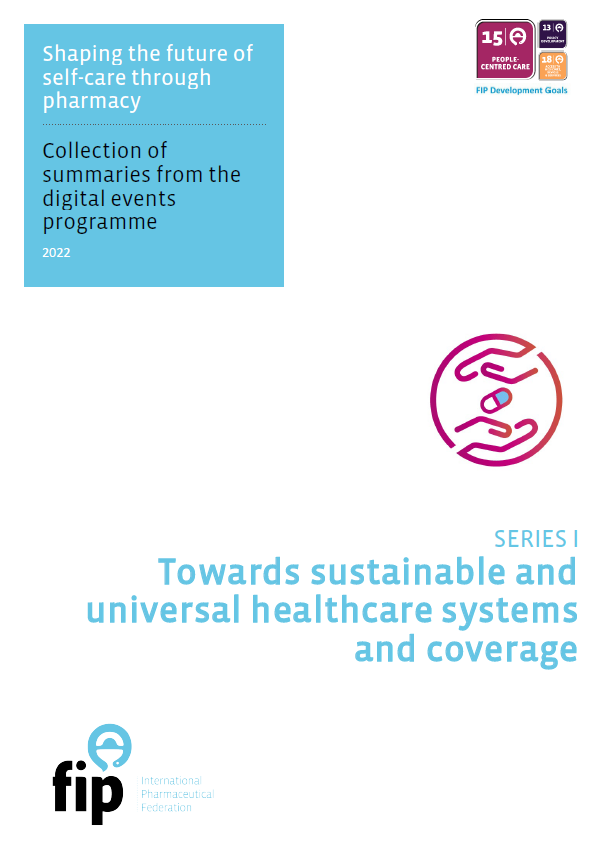
Towards sustainable and universal healthcare systems and coverage – 1st collection of summaries from the digital events programme
Pharmacists contribute daily towards making health systems more efficient and sustainable, and hence towards universal health coverage (UHC). They do this by supporting and empowering patients and consumers in making better health choices, leading to optimal outcomes. This is part of their role all around the world as healthcare professionals at the hearts of communities, who deal with consultations on a variety of self-care topics in their practice. Self-care spans the whole wellness spectrum, from disease prevention to the management of symptoms and common ailments.
The International Pharmaceutical Federation (FIP) organised a programme of digital events in 2021–22 called “Shaping the future of self-care through pharmacy”, which included two series of events focusing on the policy elements and the practice elements of this role. The first series, “Towards sustainable and universal healthcare systems and coverage”, had the following aims:
• To share and discuss strategies adopted by pharmacy leaders and workers, including FIP member organisations, to accelerate universal health coverage by enabling self-care;
• To describe sector or area-specific implications, innovations and approaches adopted across practice; and
• To discuss the implications of optimising self-care and the role of pharmacy.
These events included a variety of international stakeholders and partners in the area of self-care, such as the Global Self-Care Federation, the International Self-Care Foundation, the Pharmaceutical Group of the European Union, the Association of the European Self-Care Industry, and others.
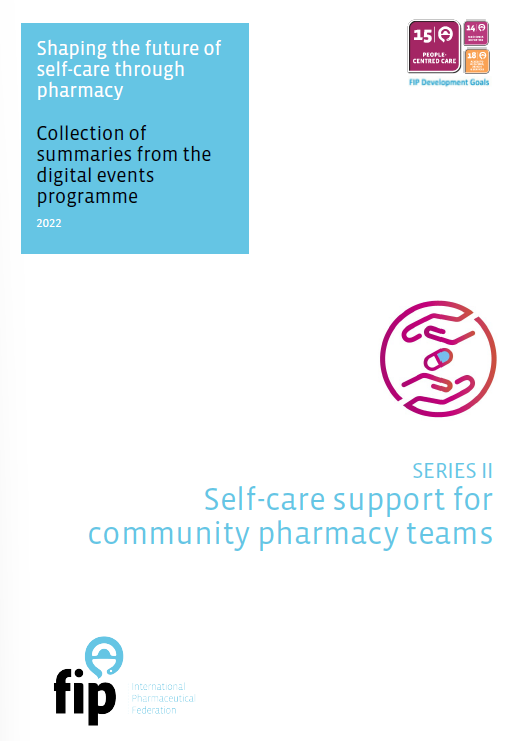
Self-care support for community pharmacy teams – 2nd collection of summaries from the digital events programme
Community pharmacies are often the first point of contact for patients and the public with a healthcare professional, for consultations and triage of common ailments and advice on non-prescription medicines. This important role — which leverages the accessibility of community pharmacists and the trust placed upon them by the population — delivers great value not only for patients and consumers, but also for healthcare systems and society as a whole.
Acknowledging the importance of this role, the International Pharmaceutical Federation (FIP) places great emphasis on advocating its adequate recognition but also on providing practising pharmacists with resources to support it and facilitate its implementation in practice. For that reason, FIP organised a programme of digital events in 2021–22 called “Shaping the future of self-care through pharmacy”, which included two series of events focusing on the policy elements and the practice elements of this role. The second series, “Self-care support for community pharmacy teams”, had the following aims:
• To provide relevant information, guidance and updates for pharmacists and the pharmacy workforce on self-care so they can take a person-centred approach;
• To describe sector- or area-specific implications, innovations and approaches adopted across practice;
• To engage front-line workers of the health and pharmacy workforce to know about the self-care realities facing them around the world;
• To discuss the implications of optimising self-care and the role of pharmacy;
• To consider common conditions and how they can be supported through self-care; and
• To assess and discuss the evidence behind treatments used in self-care.
These events covered a range of clinical areas that community pharmacists are commonly consulted about. They included experts with different academic or professional backgrounds, who shared their expertise on how pharmacists can have a direct impact on patients’ well-being through self-care.
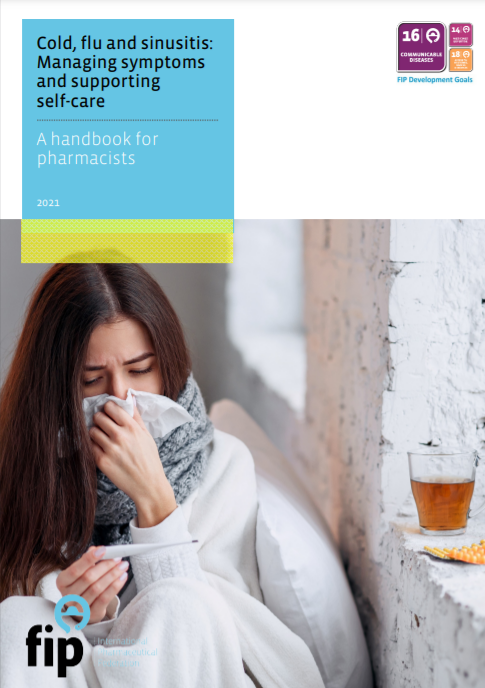
Cold, flu and sinusitis: Managing symptoms and supporting self-care. A handbook for pharmacists
Pharmacists are embedded key players in the health landscape of their communities and are trusted for
patient-centred, comprehensive, timely advice. The accessibility of pharmacy means that the knowledge and
skills of community pharmacists are extensively sought by everyone from teenagers to new parents, to older
adults and everyone in between. This handbook will further strengthen their essential role within the
community to provide optimal patient care and support informed self-care.
This publication serves as a ready-to-use reference document covering different aspects of the management of
common URTIs in the community setting. Throughout the various sections, guidelines, algorithms and
summary tables, this handbook is meant to support pharmacists in promoting respiratory well-being,
developing a thorough understanding of commonly encountered URTIs, and navigating through both nonpharmacological and pharmacological management options.
Online pharmacy operations and distribution of medicines. Global Survey Report FIP Community Pharmacy Section
The aim of the study was to provide a global snapshot of online pharmacy operations and the distribution of medicines
on the internet; determine how online pharmacy operations may impact patient safety; and determine the impact of
online pharmacy sales (actual or perceived) on brick-and-mortar pharmacies.
Community pharmacy at a glance 2021 – Regulation, scope of practice, remuneration and distribution of medicines through community pharmacies and other outlets (2021)
The scope of community pharmacy practice and the sector’s regulation, distribution of medicines and remuneration are among the aspects explored in this FIP report. The report presents data from 79 countries that took part in a detailed survey between November 2020 and January 2021, giving the most up-to-date snapshot of the state of community pharmacy around the world.
Community pharmacy global report 2021 – Regulation, scope of practice, remuneration and distribution of medicines through community pharmacies and other outlets
FULL REPORT – FOR FIP MEMBER ORGANISATIONS ONLY
The scope of community pharmacy practice and the sector’s regulation, distribution of medicines and remuneration are among the aspects explored in this FIP report. The report presents data from 79 countries that took part in a detailed survey between November 2020 and January 2021, giving the most up-to-date snapshot of the state of community pharmacy around the world.
The global threat of air pollution and its impact on patient care: Supporting pharmacy practice and workforce development
This reports the outcomes of a roundtable organized by The Clean Breathing Institute & International Pharmaceutical Federation (FIP).
Nutrition and weight management services: A toolkit for pharmacists (2021)
The aim of this toolkit is to equip pharmacists with knowledge in general nutrition and general weight management strategies so they can play an increased role in the communities they serve and support other healthcare providers involved in their patients’ care, including general and specialist physicians, nurses, dieticians, nutritionists, dentists etc., and to be proactive in facilitating discussions about nutrition and physical activity with their patients. Pharmacists across the world are already taking steps to promote healthy lifestyles among their patients through a variety of innovative initiatives, ranging from educational campaigns to more direct patient counselling strategies and programmes.
Joint Statement of Policy by the International Pharmaceutical Federation (FIP) and the Global Self-Care Federation (GSCF) on Responsible and Effective Self-care (2021)
The objective of this statement is to describe the united role and intention of the pharmacy profession and industry in delivering solutions to people to facilitate self-care and in engaging with stakeholders including governments to further develop self-care as a core pillar of sustainable healthcare systems. This statement considers regulated or evidence-based selfcare products designed to promote good health, or to prevent and/or to treat ill health through self-care, and to achieve positive outcomes for people’s health. In this context, pharmacists play a key role when assisting individuals as they can provide unbiased, evidence based advice and information about regulated or evidence-based self-care products and services available.

Mitigating the impact of air pollution on health: The role of community pharmacists – Global survey report
In 2019, the World Health Organization (WHO) listed air pollution and climate change as one of the top 10
threats to global health. According to the WHO, air pollution is the greatest environmental risk to health, with
nine out of 10 people breathing polluted air every day.
Between May and June 2020, FIP conducted the first-ever survey on “Air pollution and respiratory health:
Awareness and roles of community pharmacists”. Responses were received from 62 countries and territories.
FIP conducted this survey with the aims of better understanding pharmacists’ awareness of the impact of air
pollution on respiratory health, their current role in respiratory care, and what are the main barriers and
drivers for them to fully realise this role, such as gaps in knowledge, tools and other resources, including the
availability of guidelines. The data and intelligence emerging from this survey may inform policymaking,
advocacy efforts and new service development by pharmacist organisations around the world.
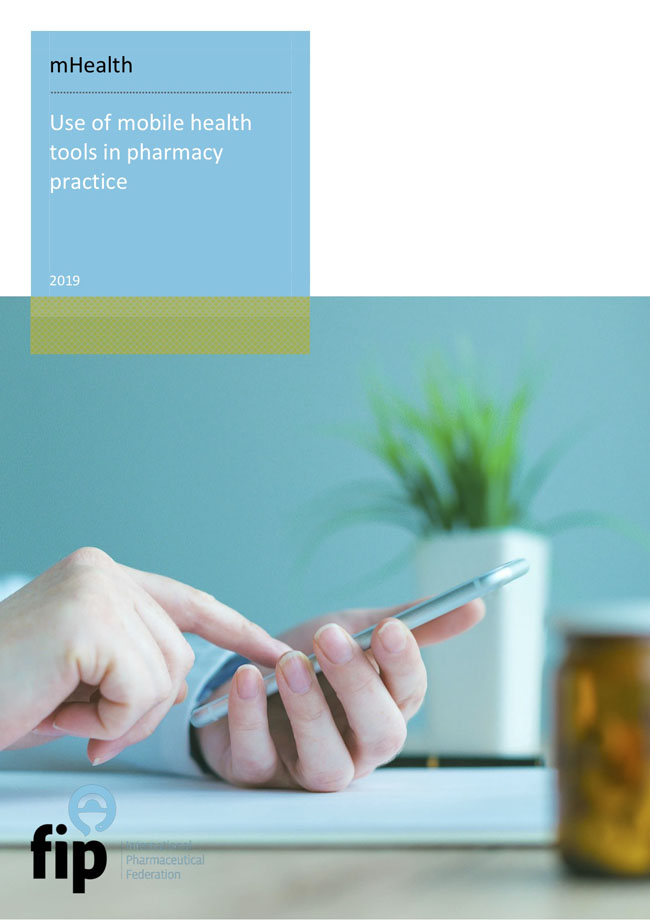
mHealth: Use of mobile health technologies in pharmacy practice
In a world of constant technological advances, it is important that healthcare professionals make use of technology to
support patients and provide health care to ensure an optimal quality of life. Mobile health (mHealth) uses mobile
technologies to assist healthcare professionals in providing efficient and adequate patient care. Mobile applications
play an important role in mHealth, as they allow users to access information quickly, at the touch of a finger. This report
discusses how mHealth assists pharmacists in providing patients with the best care possible.
Through the use of mobile applications, pharmacists can stay up to date with disease state guidelines, maintain
adequate pharmacy stock inventories, access drug information systems, review patient health information and use tools
to calculate individual drug doses and to accurately convert between units of measurement. Mobile devices may also
assist pharmacists by converting smart phones into point-of-care diagnostic tools, such as otoscopes or blood pressure
monitors. Mobile applications can also help patients manage disease states, improving their medication adherence, and
logging important health history. mHealth mobile applications have the ability to support pharmacy practice, as well as
patients’ lives.
Although mHealth is constantly advancing in global health care, patient confidentiality risks, variable IT literacy and
internet access requirements are barriers that stand between patients/healthcare providers and the ability to fully take
advantage of mHealth technologies. The goal of mHealth in the field of pharmacy should be to support and assist
individuals in providing safe, effective and efficient patient-centred care.

Pharmacists supporting women and responsible use of medicines: Empowering informal care givers (2018)
Women are the non-professional caregivers closest to healthcare professionals and are often the ones who visit pharmacies and assume responsibilities for health in the household. In general, women tend to seek treatment and visit doctors or pharmacies (and pharmacists) more frequently than men do. It is often the woman who encourages family members to visit a healthcare professional and who makes sure they take medicines and understand the treatment.
Pharmacists should support women in these emerging roles, because medicines are like a double-edged sword — of great benefit if used correctly, but capable of causing harm if used incorrectly. In this reference document, attention is paid to the fact that women as informal caregivers considerably lighten the load of the healthcare labour force, often playing a crucial and underappreciated role in providing healthcare to families and communities.
Pharmacy as a gateway to care: Helping people towards better health (2017)
This reference paper reviews the current state of consumer interest in health care and presents a collection of evidence of pharmacy services related to self-care and the value that pharmacists bring to health care systems in this way. It lays out the drivers of self-care and profound changes in the way health care systems operate.
Pharmacy a gateway to care: policy statement (2017)
This statement underscores the importance and benefits of self care. It recognises both the personal responsibility of patients to enhance and maintain their own health and well-being, and the responsibility of pharmacists to support patients in self care activities. Appropriate support by pharmacists will assist patients in improved or maintained health, greater health self-efficacy, and higher economic efficiency.
Events/Webinars
In 2021, FIP launched the online programme “Shaping the future of self-care through pharmacy” with support from Reckitt.
As healthcare providers, pharmacists have an important role to play in supporting self-care. This programme is composed of 8 episodes that will focus on accelerating UHC for all by enabling self-care through community pharmacy, plus nine episodes focusing on self-care support for community pharmacy teams.
Below you may find the description and links to the recordings of these events, and to other FIP digital events related to self-care. Events are presented in chronological order, from more recent to older. Please scroll down inside the grey area or using the scroll bar on its side to find more FIP events. You may also want to check the upcoming digital events at www.events.fip.org.
Gut wellness and its role in immunity
July 20, 2022
Several factors can influence digestive wellness and gut wellness, including stress, nutrition or medication. Disruptions to the microbiota homeostasis can lead to gastrointestinal symptoms and have an impact in immunity. This event will discuss dysbiosis and the role that pharmacists can have in improving gut wellness and immunity.
By the end of the session participants should be able to:
• Understand dysbiosis and gut wellness
• Identify tips to manage abdominal pain
• Understand the role of diet in immunologic modulation
• Understand the use of probiotics for gut wellness
Moderator:
– Bidhata Khatri, FIP Health and Medicines Information Section (HaMIS) Secretary FIP, India
Panelists:
– Saman Khalesi, Senior Lecturer and Discipline Lead – Nutrition Central Queensland University (CQUniversity); Postdoctoral Fellow of the National Heart Foundation of Australia, Australia
– Ana Faria, Assistant Professor Nova Medical School – Universidade Nova de Lisboa, Portugal
– Ender Pehlivanoglu, Professor of Pediatric Gastroeneterology&Nutrition Istanbul Kent University, Turkey
– Metehan Özen, Pediatric Infectious Disease Specialist Acibadem University, School of Medicine, Turkey
Watch video
Gut wellness and its role in immunity (Spanish translation)
July 20, 2022
Several factors can influence digestive wellness and gut wellness, including stress, nutrition or medication. Disruptions to the microbiota homeostasis can lead to gastrointestinal symptoms and have an impact in immunity. This event will discuss dysbiosis and the role that pharmacists can have in improving gut wellness and immunity.
By the end of the session participants should be able to:
• Understand dysbiosis and gut wellness
• Identify tips to manage abdominal pain
• Understand the role of diet in immunologic modulation
• Understand the use of probiotics for gut wellness
Moderator:
– Bidhata Khatri, FIP Health and Medicines Information Section (HaMIS) Secretary FIP, India
Panelists:
– Saman Khalesi, Senior Lecturer and Discipline Lead – Nutrition Central Queensland University (CQUniversity); Postdoctoral Fellow of the National Heart Foundation of Australia, Australia
– Ana Faria, Assistant Professor Nova Medical School – Universidade Nova de Lisboa, Portugal
– Ender Pehlivanoglu, Professor of Pediatric Gastroeneterology&Nutrition Istanbul Kent University, Turkey
– Metehan Özen, Pediatric Infectious Disease Specialist Acibadem University, School of Medicine, Turkey
Watch video
Gut wellness and its role in immunity (Portuguese translation)
July 20, 2022
Several factors can influence digestive wellness and gut wellness, including stress, nutrition or medication. Disruptions to the microbiota homeostasis can lead to gastrointestinal symptoms and have an impact in immunity. This event will discuss dysbiosis and the role that pharmacists can have in improving gut wellness and immunity.
By the end of the session participants should be able to:
• Understand dysbiosis and gut wellness
• Identify tips to manage abdominal pain
• Understand the role of diet in immunologic modulation
• Understand the use of probiotics for gut wellness
Moderator:
– Bidhata Khatri, FIP Health and Medicines Information Section (HaMIS) Secretary FIP, India
Panelists:
– Saman Khalesi, Senior Lecturer and Discipline Lead – Nutrition Central Queensland University (CQUniversity); Postdoctoral Fellow of the National Heart Foundation of Australia, Australia
– Ana Faria, Assistant Professor Nova Medical School – Universidade Nova de Lisboa, Portugal
– Ender Pehlivanoglu, Professor of Pediatric Gastroeneterology&Nutrition Istanbul Kent University, Turkey
– Metehan Özen, Pediatric Infectious Disease Specialist Acibadem University, School of Medicine, Turkey
Watch video
The role of pharmacists in the management of irritable bowel syndrome
July 15, 2022
Irritable bowel syndrome (IBS) is a common chronic gastrointestinal disorder that affects people of all ages. Pharmacists can play an important role in symptom management, referral to other healthcare professionals and provision of advice to improve quality of life. This event will provide an overview of the main roles pharmacists can have in supporting people living with IBS, from a community pharmacy perspective.
By the end of the session participants should be able to:
• Discuss the role of community pharmacists around IBS
• Understand the difference in symptoms between abdominal cramping pain and IBS
• Identify red flag symptoms for referral of IBS patients
Watch video
Developing Global Pharmacist Travel Health Services
July 8, 2022
The demand for travel health and travel medicine services is rapidly growing with the return levels of international travel. Patients are frequently turning to community pharmacies for advice on disease reduction and maintaining personal health whilst travelling. Pretravel preparation is important for many reasons one of which is supporting Global Health policies and strategies.
In some countries legislation has been devolved to allow pharmacists to prescribe medication and vaccinate travellers. However, this is not the situation globally and the many countries place restrictions on this type of pharmacy practice.
Learning objectives:
– To raise the awareness of pretravel consultation service that can be provided in a community setting without prescribing or vaccination.
– To identify over-the-counter products that can be supplied to support travellers visiting a pharmacy
– Compare and contrast classes of over-the-counter products for selected conditions and identify/select appropriate patients for their use.
– Showcase the collaborations with the International Institute of Travel Medicine through membership of ISTM and completion of Certificate of Health
Moderator:
– Daragh Connolly, President Community Pharmacy Section, Ireland
Panelists:
– Derek Evans, Pharmacist Specialist in Travel Medicine Evans Travel Health consultancy, UK
– Karl Hess, Director, Community Pharmacy Practice Innovations Department of Pharmacy Practice, Chapman University School of Pharmacy, Irvine, California, USA
– Sheila Seed, Professor and Chair of Pharmacy Practice, Massachusetts College of Pharmacy and Health Sciences, USA
– Larry Goodyer, Professor of Pharmacy Practice, Leicester School of Pharmacy Faculty of Health and Life Sciences, De Montfort University, UK
Watch video
What you need to know about healthy nutrition for pharmacy
July 5, 2022
This first event in the FIP 2022 series ‘Food for thought: Pharmacists’ role in health nutrition’ aims to describe the basics of nutrition for pharmacists, and the role of pharmacists in providing nutrition services for better health outcomes, expanding from the 2021 FIP report “Nutrition and weight management services: A toolkit for pharmacists”.
Moderator:
– Jaime Acosta, Community Pharmacist, Farmacia Acosta, Spain
Panellists:
– Joanna Harnett, Senior Lecturer, Sydney Pharmacy School, Australia
– Rúben Viegas, Practice Development Projects Coordinator, FIP, Portugal
Watch video
The management of constipation by community pharmacists
June 7, 2022
Constipation is a common symptom pharmacists encounter in daily practice. It is often a self-limiting symptom that can be adequately managed in the community through the use of non-prescription medicines, as well as dietary and lifestyle measures. This event will explore how community pharmacists may support the management of constipation and empower individuals for optimal self-care.
By the end of the session participants should be able to:
• Understand the role of pharmacists in managing constipation in the community
• Understand the influence of fibre, exercise, and fluids in constipation
• Explore the complications of constipation medicines, especially in older adults
Moderator:
– Marwan Akel, FIP Projects Manager – Workforce development, evidence & impact, Lebanon
Panellists:
– Safwan Jihan, Assistant Dean, Lebanese International University / School of Pharmacy, Lebanon
– Madisch, Ahmed, Senior Consultant and Head, Center of Gastroenterology Bethanien, Germany
– João Rafael Gonçalves, Community pharmacist, Portugal
Watch video
The role of pharmacists in digestive wellness: an overview
May 30, 2022
Gastrointestinal health and digestive wellness can be influenced by several lifestyle factors, including diet and stress, and using certain types of medicines. It is important for pharmacists to consider these factors when interacting with patients who present with such symptoms. Different non-prescription medicines are available to treat symptoms related to GI complaints and digestive wellness, rendering pharmacies key access points for trusted advice and access to self-care products which can provide relief and care to affected individuals. This event marks the World Digestive Wellness Day (29 May).
By the end of the session participants should be able to:
• Understand the role of pharmacists in providing advice on digestive wellness
• Understand the relationship between gut wellness and immunity
• Identify practical ways to support better digestive wellness in the community
Watch video
Empowering self-care through pharmacy – Guidelines and resources for pharmacists
February 23, 2022
Self-care is an integral part of healthcare systems, contributing to healthcare cost savings, better allocation of resources and improved health outcomes in the population. Pharmacists are well placed in the community to support health-related decisions and facilitate informed self-care. FIP aims to support pharmacists in this role through advocacy and by developing professional resources in the area of self-care. This event will showcase a variety of FIP publications, including the launch of a new handbook.
Watch video
Supporting self-care: sexual health
January 20, 2022
Pharmacy teams are increasingly providing services that support people to self-care with their sexual health. This webinar will focus particularly on advice, screening and testing, as well as appropriate management of choices of medicines and products to support sexual health. A case study will be presented and the event will conclude with a panel discussion.
Watch video
Innovation in self-care models, shaping the future together.
January 13, 2022
This event discusses how targeted switching of prescription only medicines to non-prescription medicines (Over The Counter medicines) can contribute to self-care of a nation’s population. Availability of diagnostics in the pharmacy and beyond can also make an impact on self-care.
Watch video
Supporting self-care: children’s health
December 16, 2021
Pharmacy teams are increasingly supporting children and their carers with self-care. This webinar will focus particularly on appropriate management of choices of medicines and products to support children’s health, and the role of the pharmacist. A case study will be presented and the event will conclude with a panel discussion.
Watch video
Self-care’s contribution to universal health coverage – Healthcare’s and people’s perspectives
December 9, 2021
There is variability across the globe in the provision of universal healthcare. Self-care is the ability to maintain and improve individual’s health, prevent or limit diagnosed illnesses, and address self-treatable conditions. Self care is not no care and it is not necessarily practised in isolation. It may involve support and advice from others, such as expert pharmacy teams. This event discusses how self-care can contribute to Universal Health Coverage from the perspectives of providers of healthcare services and public and patients.
Watch video
Supporting self-care: Gastrointestinal complaints and treatments
December 2, 2021
Gastrointestinal symptoms have an impact on the health and wellbeing of individuals that can be debilitating, however, the majority of people can be supported by the pharmacy team to self-care and effectively manage their symptoms.
Watch video
Supporting self-care: Sore throat
November 23, 2021
Sore throat is a common self-limiting condition which often leads to patients presenting in the pharmacy for advice, treatment options and reassurance. Sore throat is predominantly a viral condition for which symptomatic management offers the most appropriate course of action. Effective diagnosis, communication and managing expectations can prevent unnecessary onward referral or inappropriate antibiotic use.
Watch video
Supporting self-care: disinfection in common conditions
October 15, 2021
Hygiene practices including hand and surface disinfection form part of our first line of defence by helping to reduce the spread of the infections such as COVID-19. These interventions also have an impact on many common infections such as cold and seasonal flu. The pharmacy team are the most accessible healthcare provider and are a convenient source of advice for patients and public in the maintenance of appropriate hand and surface hygiene practices.
Watch video
Accelerating selfcare to achieve Universal Health Coverage
October 6, 2021
This event asked how healthcare can be rebuilt amidst a global pandemic and focus on the important role that selfcare plays. It also looked at the enablers that will accelerate self-care through community pharmacy and how this builds towards Universal Health Coverage.
Watch video
Understanding and managing headaches in the community: Therapeutic approaches and advancements in the Southeast Asia region
September 16, 2021
Pain is a common symptom of a range of conditions or situations, and can manifest and be experienced with different intensities, from mild discomfort to highly incapacitating. A particular type of pain that often leads to consultations to pharmacists and the use of self-care medicines is headache. Relieving headaches and regaining mental clarity are important for patient wellbeing and productivity, and pharmacists can play a role in advising on the most appropriate strategies and therapeutic approaches that are suitable for each patient.
Watch video
Understanding and managing headaches in the community: Therapeutic approaches and advancements in the Eastern Mediterranean Region
September 16, 2021
Pain is a common symptom of a range of conditions or situations, and can manifest and be experienced with different intensities, from mild discomfort to highly incapacitating. A particular type of pain that often leads to consultations to pharmacists and the use of self-care medicines is headache. Relieving headaches and regaining mental clarity are important for patient wellbeing and productivity, and pharmacists can play a role in advising on the most appropriate strategies and therapeutic approaches that are suitable for each patient.
Watch video
Understanding and managing headaches in the community: Therapeutic approaches and advancements in the Europe region
September 16, 2021
Pain is a common symptom of a range of conditions or situations, and can manifest and be experienced with different intensities, from mild discomfort to highly incapacitating. A particular type of pain that often leads to consultations to pharmacists and the use of self-care medicines is headache. Relieving headaches and regaining mental clarity are important for patient wellbeing and productivity, and pharmacists can play a role in advising on the most appropriate strategies and therapeutic approaches that are suitable for each patient.
Watch video
Strategies towards improved patient outcomes with OTC analgesics
September 14, 2021
Support pharmacists to play an advisory role in community pain management with OTC analgesics.
The learning objectives of this symposia involves providing community pharmacists with:
– Consumer perspectives towards their pain management
– Importance of stratifying treatment based on patient underlying conditions & needs
Watch video
Understanding and managing headaches in the community: Therapeutic approaches and advancements in the Americas
September 13, 2021
Pain is a common symptom of a range of conditions or situations, and can manifest and be experienced with different intensities, from mild discomfort to highly incapacitating. A particular type of pain that often leads to consultations to pharmacists and the use of self-care medicines is headache. Relieving headaches and regaining mental clarity are important for patient wellbeing and productivity, and pharmacists can play a role in advising on the most appropriate strategies and therapeutic approaches that are suitable for each patient.
Watch video
Understanding and managing headaches in the community: Therapeutic approaches and advancements in the Western Pacific region
September 13, 2021
Pain is a common symptom of a range of conditions or situations, and can manifest and be experienced with different intensities, from mild discomfort to highly incapacitating. A particular type of pain that often leads to consultations to pharmacists and the use of self-care medicines is headache. Relieving headaches and regaining mental clarity are important for patient wellbeing and productivity, and pharmacists can play a role in advising on the most appropriate strategies and therapeutic approaches that are suitable for each patient.
Watch video
Understanding and managing headaches in the community: Therapeutic approaches and advancements in the African region
September 13, 2021
Pain is a common symptom of a range of conditions or situations, and can manifest and be experienced with different intensities, from mild discomfort to highly incapacitating. A particular type of pain that often leads to consultations to pharmacists and the use of self-care medicines is headache. Relieving headaches and regaining mental clarity are important for patient wellbeing and productivity, and pharmacists can play a role in advising on the most appropriate strategies and therapeutic approaches that are suitable for each patient.
Watch video
Supporting self-care: Women’s health
September 9, 2021
Pharmacy teams are increasingly supporting patients with self-care. This webinar focused particularly on appropriate management of choices of medicines and products to support women’s health, and the role of the pharmacist. A case study was presented and the event concluded with a panel discussion.
Watch video
Understanding and managing 21st century headaches in the community
September 3, 2021
Pain is a common symptom of a range of conditions or situations, and can manifest and be experienced with different intensities, from mild discomfort to highly incapacitating. Supporting patients in adequately managing pain and using medicines to alleviate it in an optimal way is a common and important part of pharmacists’ daily practice.
Watch video
Dynamics shaping the future self-care market
September 2, 2021
Self-care can empower consumers by giving them the knowledge and tools to improve the quality of their daily lives. For example, consumers often treat minor symptoms, such as a mild headache or a cold, themselves using products purchased over-the-counter at a local pharmacy or grocery store.
In 1998, a special working group of the World Health Organization (WHO) offered an inclusive definition of self-care: “Self-care in health refers to the activities individuals, families and communities undertake with the intention of enhancing health, preventing disease, limiting illness, and restoring health. These activities are derived from knowledge and skills from the pool of both professional and lay experience. They are undertaken by lay people on their own behalf, either separately or in participative collaboration with professionals.”
In today’s rapidly changing healthcare environment, self-care should be recognised as an integral element of a coordinated and comprehensive national health policy.
Watch video
Selfcare in the digital age
August 21, 2021
This event will explore latest developments in digital health that supports self-care. It will identify practical strategies to appraise latest technology and manage misinformation and the ‘infodemic’. Current practice and role of the pharmacist in digital health is also discussed.
Watch Video
Supporting self-care: Footcare in diabetes management
July 28, 2021
Diabetic foot is a devasting complication of diabetes that can lead to loss of a limb and life. It has a complex pathology characterised by neuropathy, ischaemia and slow healing. Often the resulting loss in feeling leaves patients unable to sense the damage to their feet. 451 Million suffer with diabetes worldwide, 1 in 10 will get a foot ulcer, 80% go to have an amputation, 8 out of 10 amputations can be prevented by intervention.
Watch Video
Readying the global population for self-care: Health literacy in the 2020s
July 24, 2021
This event will explore the evolution in our understanding of health literacy and identify practical strategies to improve health literacy in community populations. The role of the pharmacist in health literacy is also discussed.
Health literacy describes the skills that enable individuals to obtain, understand and use information to make decisions and take actions that have an impact on health. Several countries now have well established national strategies and plans to improve health literacy through programs to improve the skills of patients and the public, and service changes to reduce the literacy demands on patients and the public.
Watch Video
Supporting self-care: musculoskeletal pain and chronicity
June 30, 2021
The aim of this event was to identify how the community pharmacy team can support self-care for people with musculoskeletal pain
Watch Video
Distribution of medicines and promotion of responsible self-care: Channels, changes and challenges
June 22, 2021
This webinar will present selected findings from a recent FIP survey on the regulation of the distribution of medicines and pharmacists’ role in supporting responsible self-care. It will also focus on the role of pharmacies in relation to the use of generics, as well as alternative and complementary medicines.
Watch Video
Delivering person-centred support for self-care: current and future pharmacy practice
June 16, 2021
This event will showcase current self-care delivery in community pharmacy across the globe and explore how future delivery could look. People centred care is at the heart of self-care and so this is an important area to explore including the associated communication skills. Strategies to build trust and rapport is vital to self-care will also be discussed. This topic is important because pharmacy teams are increasingly supporting patients with self-care.
Watch Video
Obesity and weight management: Pharmacist-led services and approaches
June 4, 2021
This webinar will focus on the the role of community of pharmacists in weight management and obesity prevention, screening, referral and management, pharmacy-led weight management approaches and the intergenerational correlations in hypercholesterolemia and obesity. In addition, we will also present selected aspects from the FIP handbook on nutrition and weight management for pharmacists, to be launched that day.
Watch Video
Appropriate management in the choice of medicines for self-care
June 2, 2021
This event will showcase the four pillars of the FIP Community Pharmacy Section’s Vision – review, prescribe, dispense, administer. It will also signpost how to empower patients, pharmacists, healthcare professionals about the value of selfcare and the importance of appropriate management for selecting medicines for self-care.
Watch Video
Nutritional approaches to the prevention and management of non-communicable diseases: Roles for pharmacists
May 28, 2021
This webinar will focus on the role of nutrition in the prevention and management of non-communicable diseases, and the role that pharmacists can play to support healthy nutrition choices for different population groups. We plan to invite a range of expert speakers to address important aspects such as the role of community of pharmacists in diabetes prevention, screening, referral and management, the role of dietary supplements in disease management and one example of a community pharmacy nutrition service. In addition, we will also present selected aspects from the FIP handbook on nutrition and weight management for pharmacists, to be launched that day.
Watch Video
Community pharmacy regulation, access and remuneration – global trends
May 27, 2021
This webinar will present selected findings from a recent FIP survey on community pharmacy models and self-care. It will provide an overview of trends affecting community pharmacies’ sustainability, namely the impact of players such as Amazon or the evolution of remuneration models for professional services. It will also provide a snapshot of community pharmacy in China.
Watch Video
Shaping the future of self-care: healthcare needs & challenges
May 19, 2021
This event will set the scene for FIP’s self-care digital events programme. It will describe what the programme consists of and the main learning outcomes. This topic is important because pharmacy teams are increasingly supporting patients with self-care. The event will also describe what self-care involves, its benefits and the future of self-care. There will be a panel discussion about how pharmacy can shape the future of self-care.
Watch Video
Online access to medicines: lessons learnt for self-care
April 16, 2021
Online delivery of goods became very common nowadays, and even increased during COVID-19 pandemic and related lockdowns. The way consumers obtain medicines, as special type of goods, is also changing. In some countries, buying medicines online is becoming common practice, because buyers are preferring to order their medicines through a click of a button rather than taking a trip to a pharmacy or a drug store. However, online customers may have difficulty knowing whether an Internet pharmacy is a legitimate operation, without the same confidence as they would have had in the neighborhood pharmacy. What are the practices in place to make sure that the online patient or customer can rely that they will receive the medicine they need? What are the advantages and disadvantages to accessing medicines on-line from patients, as well as from pharmacists’ point of view? Since medicines are regulated products and the need for consideration of ethical issues in access to medicines is important, the online pharmacy services have both advantages and disadvantages. What are the medicines patients are allowed to receive online in different countries? What is the scope of online pharmaceutical services vis-à-vis medicine procurement, distribution, online prescriptions, internet drug information, pharmaceutical care services, etc.?
Watch Video
Self-care: managing mild COVID-19 symptoms, dispelling the myth
November 24, 2020
The aim of this event is to describe an evidence-based approach to self-care of mild COVID-19 symptoms
Watch Video
External Resources
There are currently no external resources for this category.
Resources for pharmacy professionals
In this section, pharmacy professionals can find a set of tools and resources that they can use to support their own professional development and in initiating conversations with patients and the community about vaccination.
These include videos, guidance and infographics. We invite you to visit this webpage regularly to check for new materials and translations.
CPD videos
These CPD Bites are short videos for pharmacists on specific vaccines and their use in risk population groups.
Episode 1: Pharmacists' roles in vaccination

Episode 2: Benefits of influenza vaccination in special populations
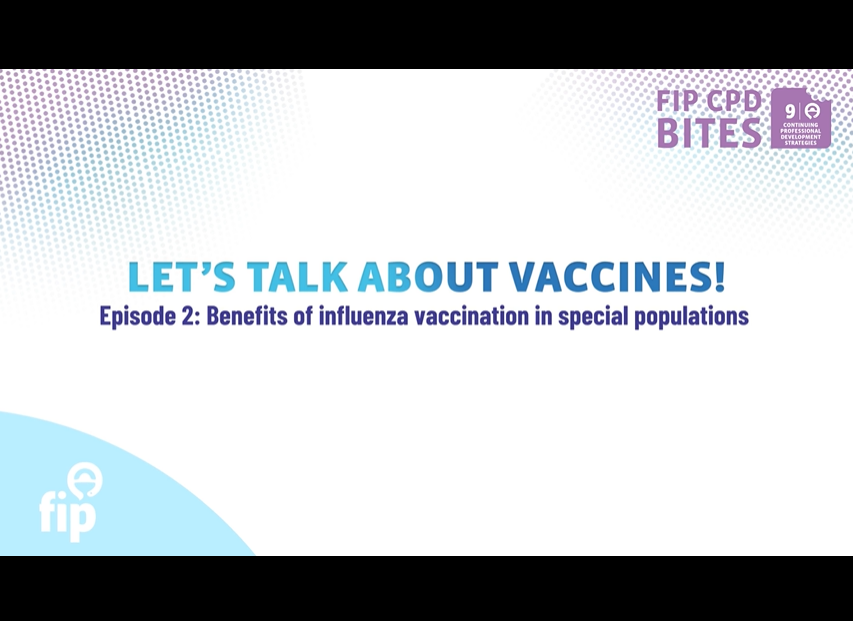
Episode 3: Benefits of pertussis vaccination in special populations

CPD Bites
These CPD Bites are short briefings for pharmacists on specific vaccines and their use in risk population groups.
Pharmacists' role in vaccination
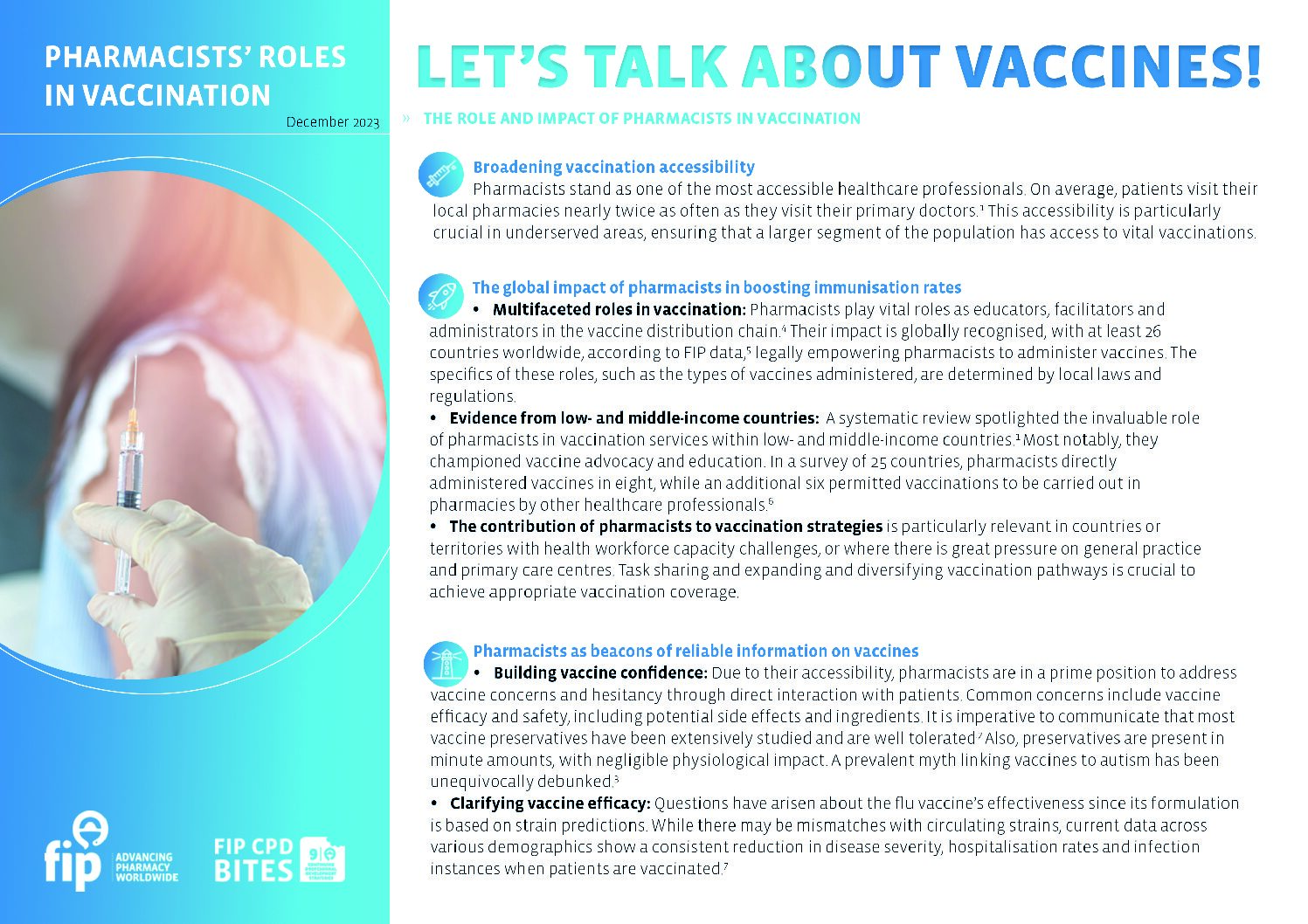
Understanding influenza
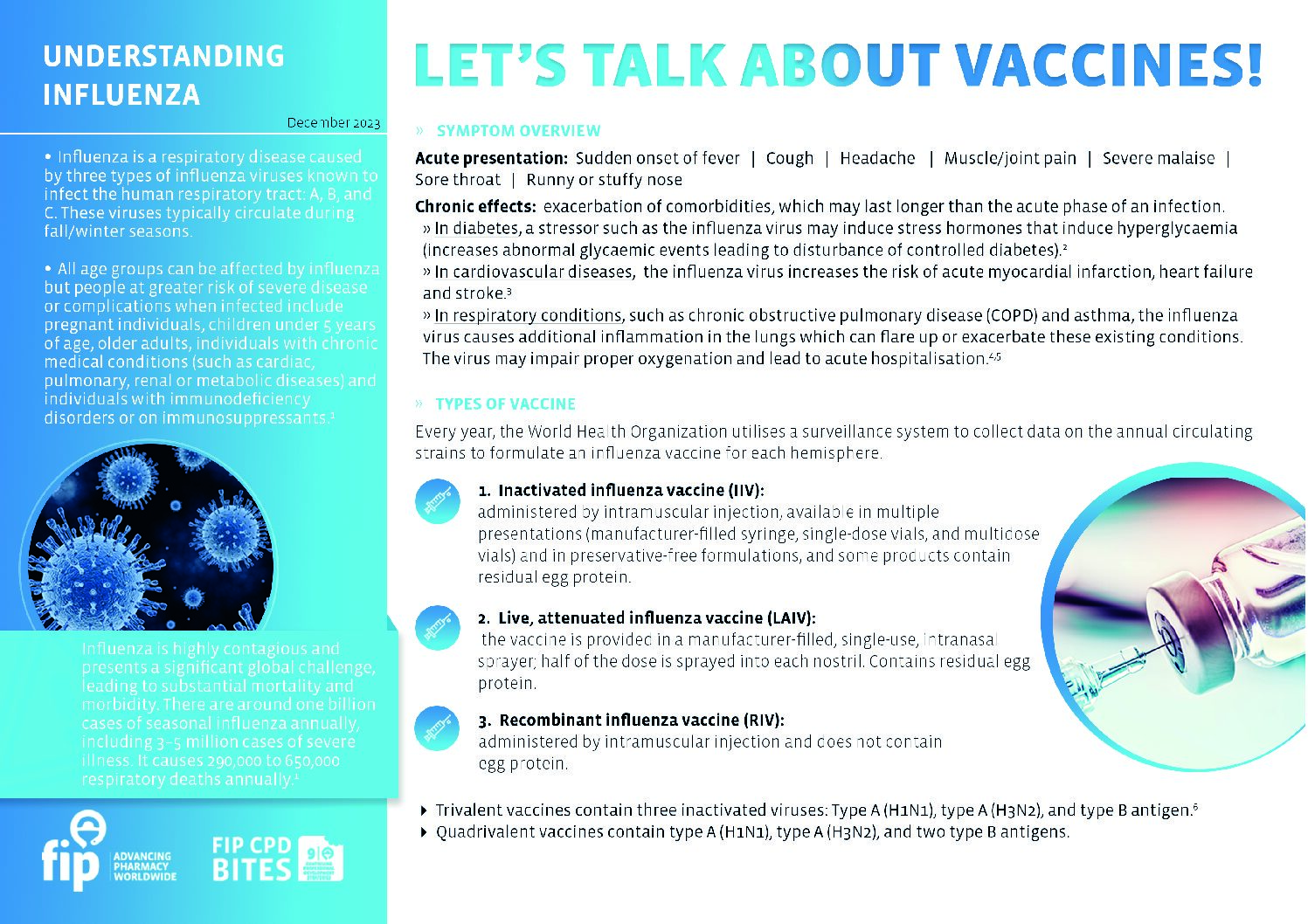
Understanding pertussis
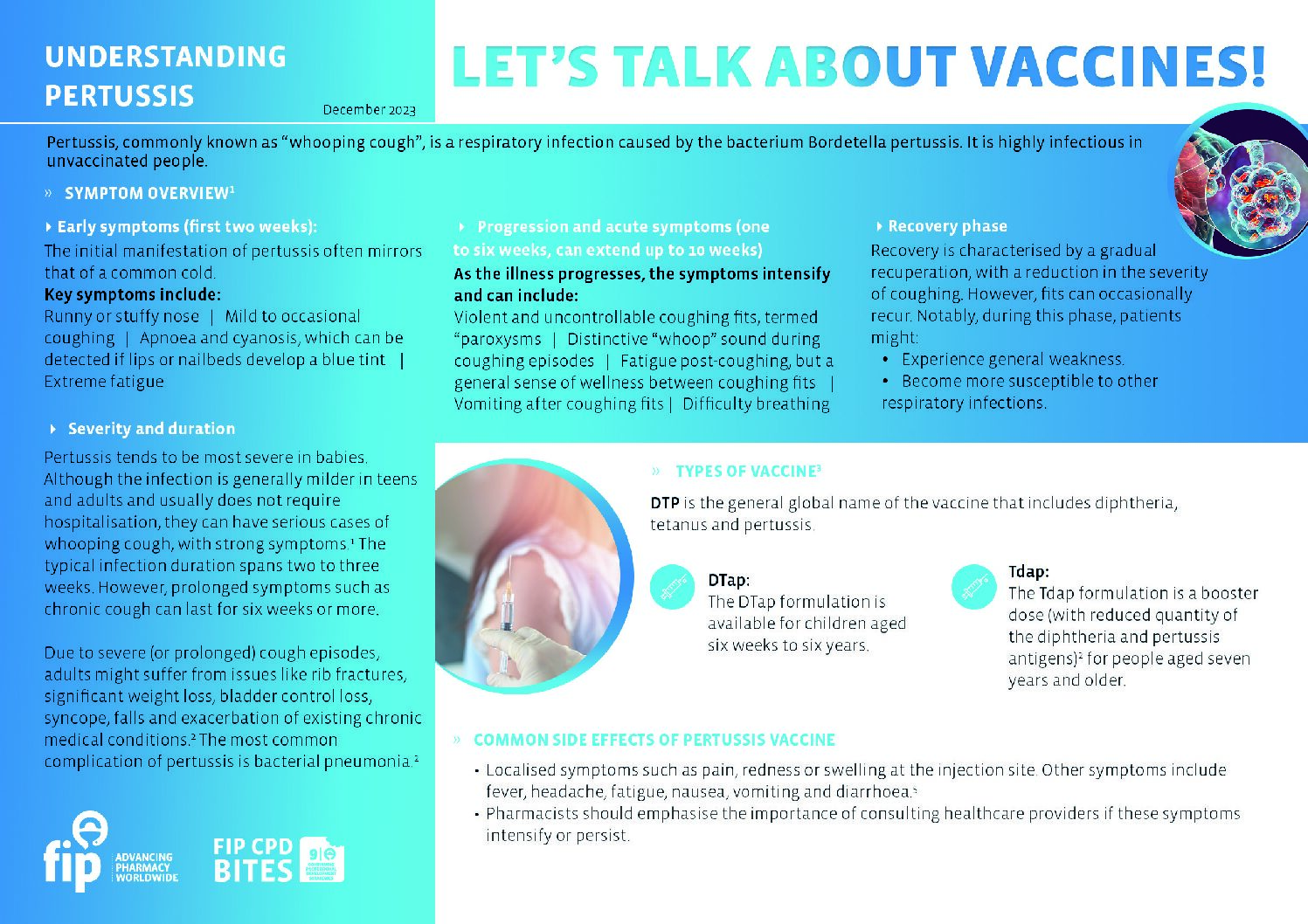
Infographic
This infographic is a summary of the main recommended vaccines and the risk groups that benefit from them.
Summary infographic of vaccination for risk groups
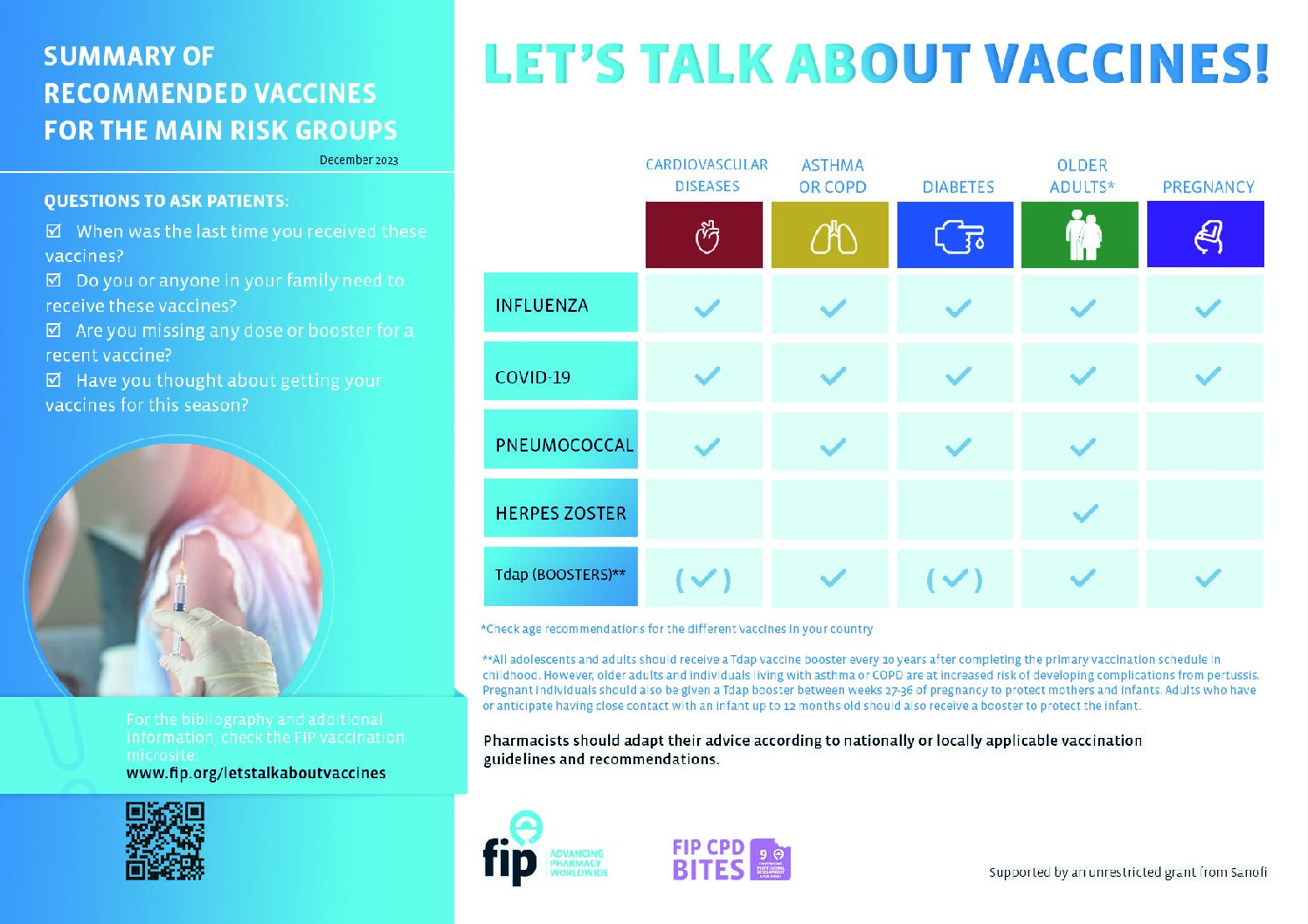
Resources for patients or the general public
Vulnerable populations, such as individuals with chronic conditions, older adults and pregnant people need reliable, accurate, and understandable information about vaccines from trusted sources. In this section, FIP provides a range of resources to be displayed at pharmacies or offered to patients and community members, to help them make informed decisions about getting vaccinated, protecting their health, and safeguarding the well-being of the community.
The materials in this page will help understanding how vaccines contribute to an improved quality of life and support learning about the importance of vaccination for different life stages and health conditions.
Video for pharmacy screens
This video can be displayed at the pharmacy. It presents the campaign resources.
Video presentation for pharmacy screens

Vaccination needs self-check
This poster can be printed and displayed at the pharmacy. It prompts the public to ask themselves a series of questions about their vaccination status and needs and invites them to ask their pharmacist for advice.
Vaccination needs self-check tool
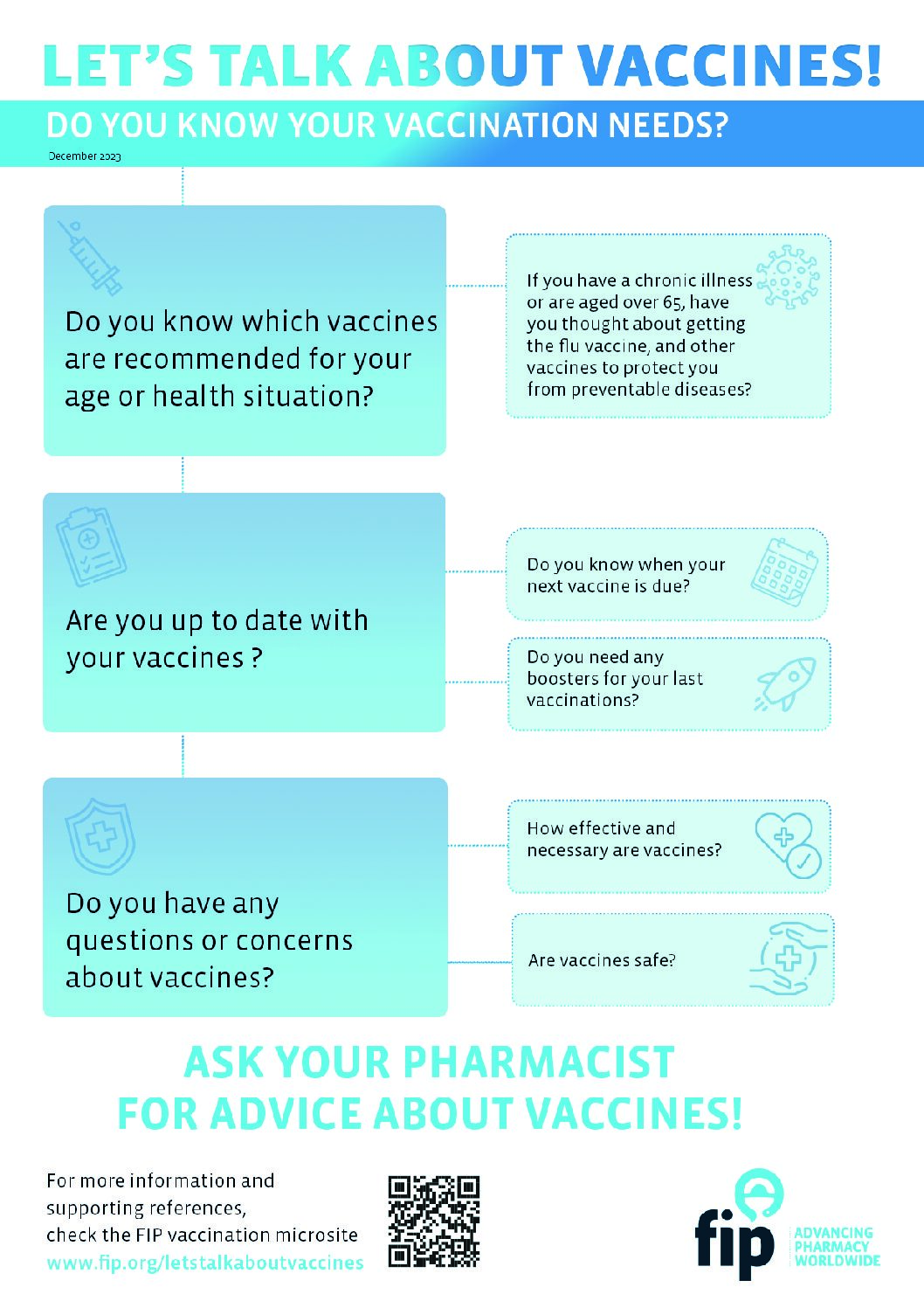
Bibliography
This bibliography includes the references used to support this campaign and cited in the various materials.
Bibliography
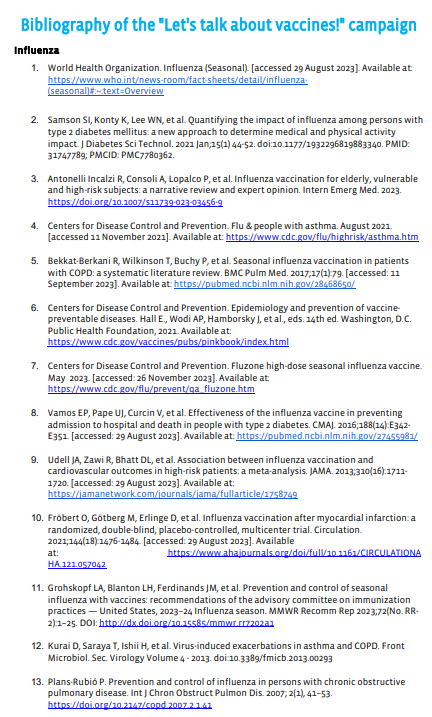
Colophon
Let’s talk about vaccines!” campaign
Copyright 2023 International Pharmaceutical Federation (FIP)
Authors:
Gonçalo Sousa Pinto, FIP Lead for Practice Development and Transformation
Dr Dalia Bajis, FIP Lead for Partnerships and Provision
Dr Ozge Ozer, FIP Education and Professional Development Manager
Rúben Viegas, FIP Practice Development and Transformation Projects Coordinator
Design and layout:
Daria van Beek, FIP Marketing Manager
Hala Fathima, FIP Marketing Coordinator
Acknowledgments:
Amira Mustafa, FIP remote intern, USA (Content development)
Dr. Eric J. Yager, Albany College of Pharmacy and Health Sciences, USA (Reviewer)
Dr. Mine Durusu Tanriover, Hacettepe University, Turkiye (Reviewer)
